The newspaper of the Independent Education Union of Australia
The NSW election on 25 March is crucial for IEU members seeking salary justice commensurate with other professions.
The NSW salary cap, now more than a decade old, snares public servants and entangles Catholic systemic teachers and support staff in its tentacles. Catholic systemic employers will not pay a cent more than our colleagues in government schools, nor will they provide it a day before.

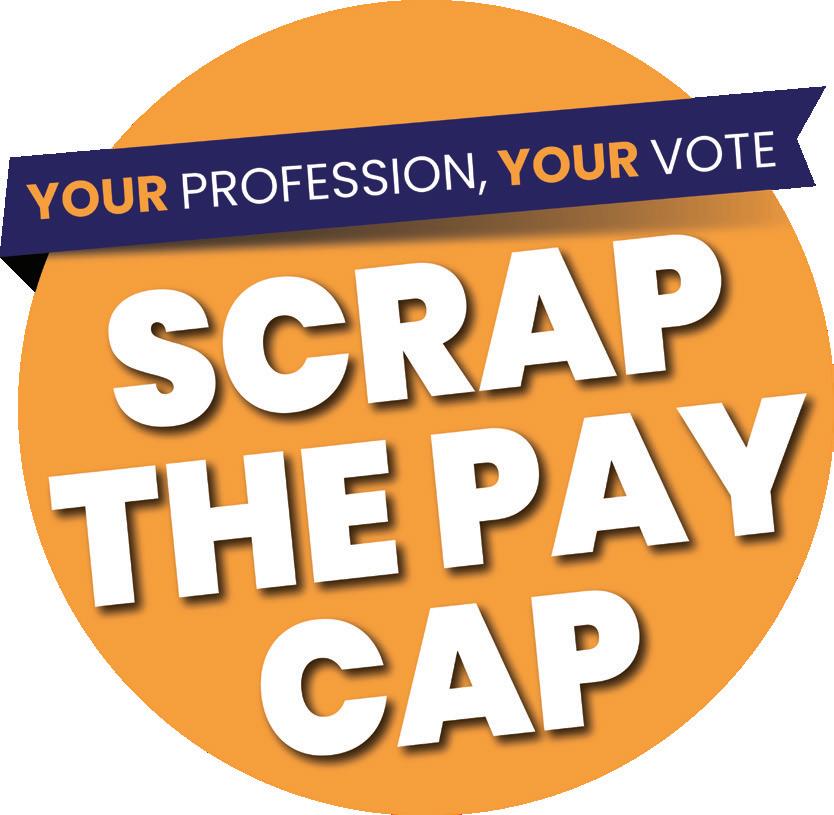
This 30-year-old ‘parity principle’ allows Catholic systemic employers to control pay levels in NSW, even though Catholic systemic enterprise agreements are not constrained by the NSW Government’s wages policy – they are covered by the Fair Work Act in the federal industrial relations system
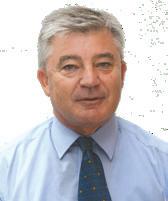
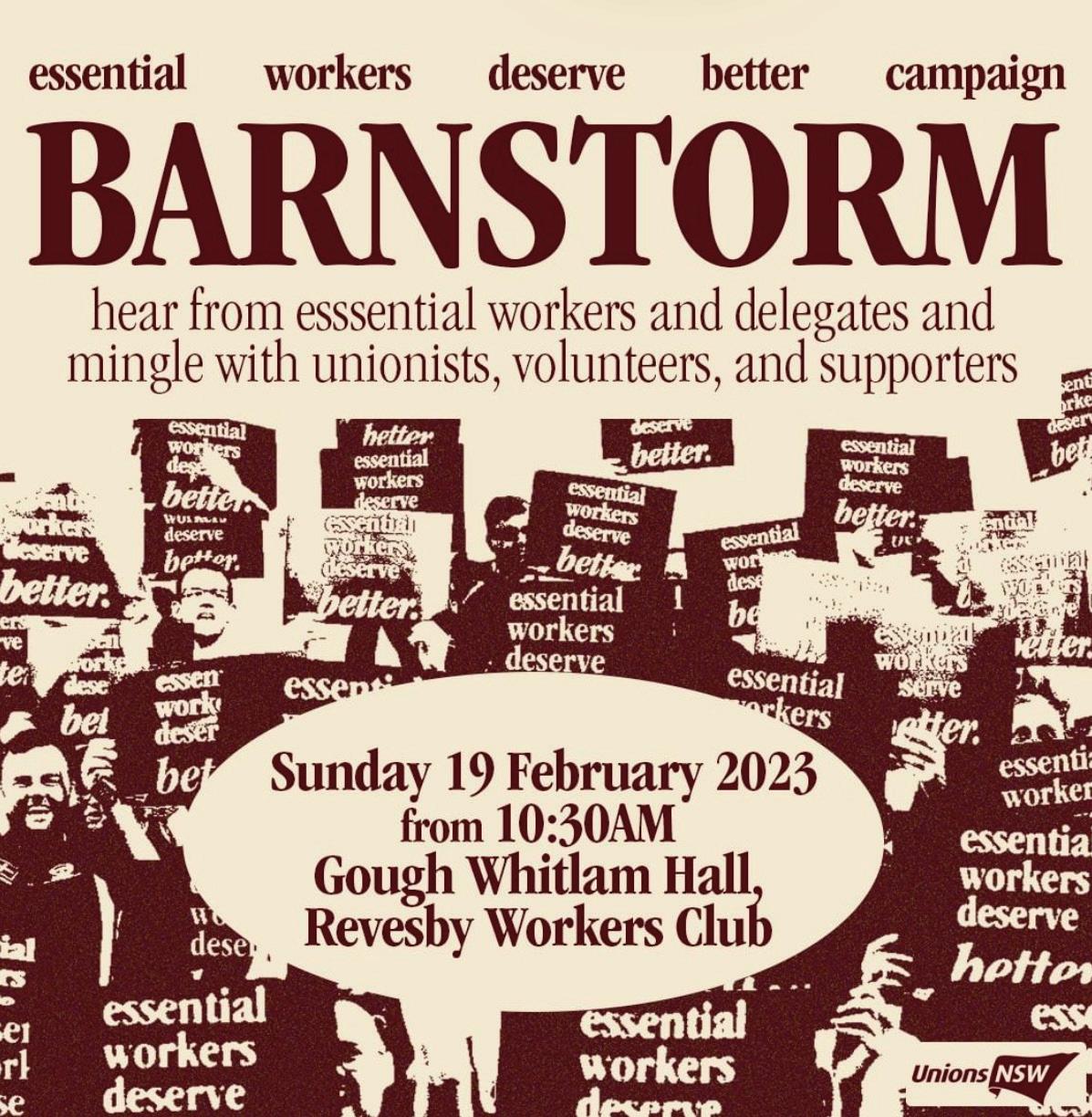
It’s a tangled approach to industrial relations that is further complicated when you consider the NSW Industrial Relations Commission (NSWIRC) is shackled by the NSW Government’s wages policy. Rather than taking a work-value approach to determine what a particular profession – say teachers and support staff – should be paid, the NSWIRC is forced to deliver a predetermined outcome, such as 2.5% annually.
The way forward is to support NSW Labor under Chris Minns. Minns attended the IEU’s Annual General Meeting in October 2022 and made it clear that if elected, the NSW salary cap would be axed and work value processes rightly returned to the industrial relations system.
This is a fair and reasonable approach – one that will provide teachers and support staff with a process that determines their worth. Put simply, the salary cap would be consigned to the dustbin of history, where it belongs.
The NSWIRC would then be empowered to carry out genuine industrial relations processes rather than simply constraining salary outcomes under a government policy that doesn’t consider factors such as staff shortages or the impact of inflation.
Want to be part of the fix?
Unions NSW (the peak body for all unions in NSW) will be providing an opportunity for IEU members to participate on election day. IEU members who choose to take up the offer will be allocated a voting booth of their choice. Generally, this is a two-hour commitment and involves handing out how-to-vote material. Teachers and support staff engaging with their local community sends a strong signal. Communities do not want teacher shortages. For more details: ieu.asn.au.
Why essential workers deserve better
Over the past 12 years, the NSW Liberal-National Government has driven down wages, conditions, skills and training and privatised billions of dollars worth of public assets.
The State Government’s wages policy has flowed beyond government employees and into the private sector, especially in health and education.
The result is a cost-of-living crisis, compounded by an essential services crisis.
Our hospitals are at breaking point – with some patients waiting up to 36 hours to be admitted to emergency because of chronic understaffing.
Essential workers, including IEU members, are exhausted – not just because of COVID but due to a lack of staff. COVID redefined the term “essential worker” to include those who risked their health for the common good, including teachers, transport workers, retail workers and food delivery riders. But in return they got low wages and surging prices. No wonder we are unable to retain workers.
However, in just a few weeks, the people of NSW will have their say on the Liberals’ and Nationals’ 12-year legacy. Do we want more of the same – further privatisation, further under-resourcing of our public services, economywide wage suppression – or a new direction?
I recently spoke to a union member whose daughter was an acting deputy principal at a school where she had taught for 10 years. She told me her daughter could not apply for a loan, not because she didn’t earn enough, but because she was still a casual. This is just one of the many examples of a system that is not working for us or our communities.
Last year’s survey of essential workers by Unions NSW found that three out of five essential workers were considering leaving their professions, with one in three looking to move and work interstate, where they could receive higher pay and better conditions.
This is why hundreds of thousands of workers, including IEU members, stood up and took industrial action during 2022, many for the first time. I called it the year of the strike for a reason – because our essential workers have had enough.
This is why Unions NSW is leading the Essential Workers Deserve Better campaign – a campaign to push all political parties to focus on a new direction that will support and retain essential workers in their professions. One simple step is to remove the ongoing casual status many teaches endure.
The campaign brings together workers from all walks of life, all industries, and professions – to remind voters
it was essential workers who put their shoulders to the wheel during the pandemic, and it is these very same workers who are being undermined by the NSW Government in the midst of our cost-of-living crisis.
Already our campaign is active in communities right across NSW, having the impactful one-on-one conversations that change votes and minds. We’ll be campaigning right up until the polls close to put pressure on the NSW Government and politicians of all parties to announce and campaign on policies that support our essential workers.
We’re calling for:
a real pay rise
fix the staffing crisis
• end privatisation
• rebuild manufacturing and local services
• same job, same pay.
These five key areas require urgent government attention and action to ensure our essential services can continue to be the bedrock of our great state and its future.
Mark Morey Secretary, Unions NSW
news month
(vol 43 #1) February 2023 PP 100000871 ISSN No: 0728-4845
NSW/ACT Branch
Hear Our Voice at the ballot box
Mark Northam Secretary
Join us
NSW Teacher Shortage Inquiry IEU speaks up for members
The union strongly supported members at the Parliamentary Inquiry into Teacher Shortages and Educational Outcomes in NSW over two days in the first week of February.
Follow

us
Newsmonth is published eight times a year (two issues per term) by the Independent Education Union of Australia NSW/ACT Branch.
Executive Editor Mark Northam, Secretary, for and on behalf of the IEU
Executive and members
Managing Editor Monica Crouch
Journalist Sue Osborne
Photo Journalist Katie Camarena
Graphic Design Chris Ruddle
Proofreader Helen O’Regan
Contributions and letters from members are welcome. These do not reflect endorsement if printed, and may be edited for size and style at the Editor's discretion. Write to:
Newsmonth
485-501 Wattle Street
ULTIMO NSW 2007
GPO Box 116
SYDNEY NSW 2001
Tel: 8202 8900
Toll free: 1800 467 943
Email: ieu@ieu.asn.au www.ieu.asn.au
This publication was produced on the unceded lands of the Gadigal People of the Eora Nation. The IEUA NSW/ACT Branch acknowledges the Aboriginal and Torres Strait Islander peoples as the traditional owners of the lands where we live, learn and work, and pay our respects to their Elders past and present.
The wide-ranging NSW Inquiry left no stone unturned, with terms of reference including current and projected teacher shortages and student enrolments, out-of-field teaching, merged classes and minimal supervision, incentive programs to address regional shortages, temporary and casual teachers, student health and wellbeing and the impact of shortages on educational outcomes.
“If anyone doesn’t believe the teacher shortage is genuine, they only need to spend half a day in this inquiry to understand its widespread impact,” said IEUA NSW/ ACT Branch Secretary Mark Northam, who addressed the Inquiry in August 2022.
Convened by NSW Upper House Portfolio Committee No 3 – Education and chaired by One Nation Member of the Legislative Council (MLC) Mark Latham, the committee comprises Nationals MLC Wes Fang, Labor MLCs Courtney Houssos and Anthony D’Adam, Greens MLC Abigail Boyd, and Liberal MLCs Aileen MacDonald and Scott Farlow. The committee is due to report on 25 February.
Free and frank exchange
“The IEU is here in the hope of developing a better shared understanding about the direct correlation between the NSW salary cap and workload intensification and the recruitment and retention issues which underpin the teacher shortage crisis we are experiencing,” said IEU Assistant Secretary Veronica Yewdall, who attended the Inquiry on 1 February at Camden Civic Centre.
“In south-west Sydney, we are aware of senior secondary colleges with severe difficulties in staffing for this year. We also have primary schools where there are no casuals available, which has an impact on literacy support and other programs.”
Yewdall, who was a primary school teacher for over 30 years, also raised the impact of education consultants and “initiative churn”, citing the example of a new mathematics program that could involve a total rewrite of the school’s current program, including staff meetings, extensive teacher training and subsequent reporting.
“I’m speaking from personal experience here,” she said. “Such a program was discredited, resulting in a new consultant and a total rewrite again of the program.”
Yewdall challenged Mr Latham’s accusation that in opposing performance pay for teachers, the IEU was “levelling down”.
“I’d like to say, Mr Latham, the premise on which you’re basing that is false,” Yewdall said. “All schools strive for excellence with the resources they have. At the moment, resourcing doesn’t just come down to money, it comes down to allowing teachers to do their job and doing something about the workload intensification. Workload intensification is what causes levelling down. It is far more responsible for a perceived decline in outcomes than anything else. Workload intensification and the loss of agency of teachers to do what is best for their students has had a catastrophic effect on outcomes.”
Yewdall also spoke about the impact of outof-field teaching. “It’s one of the contributing factors to high teacher dissatisfaction and difficulties with retention,” she said. “We have such a large, dedicated, committed and professional workforce that we are struggling to retain, and one of the frustrations revolves around the fact that they are not able to provide the education to the students that they entered the profession to provide.”
Going above and beyond
On Thursday 2 February, IEU Assistant Secretary David Towson took up the baton, addressing the Inquiry at Rydges Hotel, Baulkham Hills, in north-west Sydney.

Teacher shortages were first cab off the rank. “The Diocese of Parramatta, they’re advertising 58 jobs on their website – that was three days ago, the first day of school. It’s much more than usual,” said Towson, who was a secondary school teacher for 17 years.

I did a quick search on Seek last night. I typed in ‘teacher’ and selected the region ‘Parramatta & Western Suburbs Sydney’. There were 20 pages with 398 jobs being advertised. Now, again, this is the first week of the school year. That might not be unusual towards the end of term three or the middle of term four, but it is not normal at the beginning of a school year.”
Many of these jobs were in early childhood education centres, he added, emphasising this is also a critical part of the overall approach to education.
Towson said he’d recently spoken to a principal who said his role over the Christmas break had been one of “constant recruitment”. Ms Houssos asked about the impact of this pressure.
“It means schools are unable to provide support for beginning teachers – they don’t have the resources to do so,” Towson said.
“Similarly, the provision of professional development is being hampered. So these beginning teachers are not being supported into the profession and we’re at risk of failing them and losing them.”
Towson challenged Nationals MP Wes Fang’s allegation that teachers and support staff had become “inflexible”.
“Our members are extraordinarily flexible in answering student needs,” Towson said. “They’re not resistant to change – the changing nature of jobs has happened everywhere – they’re doing it every day, going above and beyond.”
Monica Crouch Journalist
ieunswact ieunswact (vol 43 #1) February 2023 2 newsmonth - www.ieu.asn.au
ieunswact
IEU Assistant Secretary Veronica Yewdall (at left) addressing the Inquiry on Wednesday 1 February, opposite Mark Latham, with Labor MLCs Anthony D’Adam and Courtney Houssos to her right and Liberal MLC Aileen MacDonald to her left.
IEU Assistant Secretary David Towson arrives at the Inquiry at Norwest on Thursday 2 February.
Funding disparity raises questions
Mark Northam Secretary
A significant disparity between NSW/ ACT Catholic employers’ pay offers and funding provided by the Federal Government emerged in late 2022.
The 2023 Indexation Rate is 4.3 per cent. This information goes to various dioceses in the form of a ‘funding estimates tool’ called the Funding and Data Collection. The Federal Department of Education has confirmed the following:
In 2023 the rate is 4.3 per cent. The floor of indexation is 3 per cent.
Further adjustments to the base figure are made via a calculation utilising wage indexation (75 per cent) and CPI (25 per cent). With CPI hovering around 7 per cent, the indexation has moved upwards. Further estimates are:
2024 - 3.7 per cent
• 2025 - 3.1 per cent
• 2026 - 3.3 per cent
The Catholic systemic ‘offer’ is 2.54 per cent with an undertaking to match the NSW Department of Education in 2024 and 2025. For ACT members the increases will match those provided to the ACT public school teachers.
The obvious inequities between the ‘offer’ and the actual funding level must be addressed. The IEU will be contacting Catholic Employment Relations (CER) formally to signal that good faith bargaining demands transparency.
Damning review
The Productivity Commission’s Review of the National School Reform Agreement was released at the end of January, revealing the extent of the workload crisis facing teachers.
In relation to the review, Productivity
Commissioner Natalie Siegel-Brown said “effective teaching is the single most influential ‘in-school’ factor for creating
an effective learning environment.
“Compared to many countries, our teachers work longer hours but have less time for activities that make a real difference in the classroom.”
The Commission’s review confirms what our union has been saying for years: time spent on teaching and learning is the basis of education; teachers need more time to teach.
Reducing non-teaching workload is essential. The IEU calls on all levels of government and employers to implement meaningful reforms to fix the workload crisis, reduce teacher workload and ensure teachers have time to teach.
Catholic offer falls short yet again
later – this would mean that the 2024 pay rise would be paid in January 2025 and support staff would not receive any increase in 2024!
On 15 December 2022, the IEU received a letter from Catholic Employment Relations (CER) in response to our claims for improved pay and conditions for teachers and support staff in Catholic systemic schools.
Some diocesan directors described this as “a complete offer” and the “best possible outcome” for the new enterprise agreement (EA).
However, the offer still falls short, as the directors must have understood.
CER stated that the dioceses will match the pay offers made by the NSW and ACT governments for staff in NSW and ACT government schools.
However, the offer they have made fails to match the package in the government sector.
A three-year enterprise agreement
Catholic dioceses are proposing an EA that would be in force for three years from the date of approval of the EA by the Fair Work Commission. Even if an EA were made quickly this year (and we still have not received any draft EA clauses, let alone a complete draft of the EA) this would mean the EA would be in place until mid 2026. In the government sector, the teachers award has a nominal term until the end of next year, 2024.
For teachers, CER has agreed to match “percentage increases on base wages” in the government sector during the period of the EA but the union would be unable to make any other claims for improvements in conditions or for new classifications that might be implemented in government schools. The offer also does not include matching of lump sum payments as occurred in 2022.
For support staff in NSW and the ACT, in 2024 and 2025, percentage pay rises would reflect those paid in NSW government schools but would be paid six months
It is an unprecedented proposal that the Catholic Systemic Schools EA would extend nearly two years beyond the government sector award and preclude the union from making claims for such a long period.
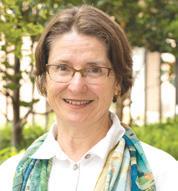
Support staff pay increases

CER has not agreed to our claim for pay increases for support staff in line with rates applying in government schools. It appears that sticking points are rates of pay for senior administrative staff in schools with an enrolment below 400 students and the definitions of the classifications for Aboriginal Education Officers. The pay rates and details of classifications proposed by CER have still not been provided to the union.
However, our employers have refused to match this! In a letter in April this year, CER stated “Should the NSW and ACT public sector teachers arrive at a position whereby additional RFF is achieved, the dioceses would, at least, commit to matching this change”. Notwithstanding this, in their December letter CER state that the union must negotiate with each individual diocese for extra release time. Although some dioceses have indicated a commitment to providing extra release on an ad hoc basis in 2023, most dioceses have not agreed to do so.
Reducing workload
Several dioceses have engaged in constructive discussions with the union about addressing teacher workload. However, there has been no development of comprehensive guidelines to achieve this, as has occurred in NSW government schools. In government schools, it is claimed that in 2022, under the Quality Time Program, a reduction of administrative work of 29 hours over a year per teacher was achieved (towards a goal of 40 hours).
In government schools, many resources are now available for optional use by teachers through the Universal Resources Hub, including lesson plans, units of work and scope and sequence documents.
Next steps
Additional release time
The NSW government has agreed to additional release for teachers in NSW government schools to focus on curriculum reform. For primary school teachers this will be an extra five hours per term in 2023, increasing to 10 hours per term in 2024 and 2025. Secondary school teachers will receive an extra five hours per term in each of 2023, 2024 and 2025.
This release is in addition to existing release from faceto-face teaching and release for early career teachers. Part-time teachers and teachers in promotions positions will get the release in proportion to their teaching load.
IEU meets with Shadow Education Minister
IEU officers are continuing to press CER and dioceses on our claims. We will do all we can to get some improvements in coming months. Clearly the outcome of the state election on 25 March will be crucial in terms of achieving higher pay increases as dioceses (other than Broken Bay) are refusing to pay higher increases than permitted under the NSW government public sector pay policy.
We will provide more detail to members in Catholic systemic schools in coming weeks.
IEU members and officers joined NSW Shadow Education Minister Prue Car MP, centre, in December for an education forum with the local community in Kiama, on the south coast.
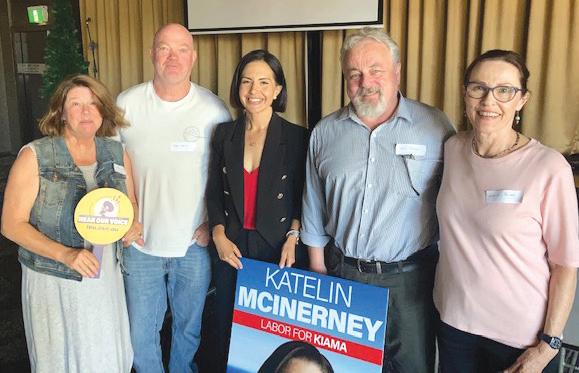
IEU Organiser Tina Smith, far left, said: “The Shadow Minister said that if a Labor government were elected in March, it would work with the IEU and the NSW Teachers Federation to address attraction and retention issues in teaching. Teacher burnout has a direct impact on students’ learning. Decisions and strategies would need to evolve along with the needs of teachers and schools.
High school teacher and member of the IEU Executive, Glenn Lowe, second from left, said: “It was great to have a conversation with the Shadow Minister for Education that focused on problems identified by practising teachers. The Shadow Minister clearly understands that a wide range of education issues need tackling in NSW, including pay, conditions and using positive language around education, teachers and the work of schools.”
IEU Organiser Valerie Jones, far right, said: “The Shadow Education Minister said a high priority for NSW Labor was listening to teachers. A forum participant noted that if affordable housing options for teachers and healthcare workers were on the agenda, then it clearly pointed to both professions needing substantial pay rises.”
IEUA NSW/ACT Branch Assistant Secretary David Towson, second from right, said: “The teacher shortage crisis needs a long-term plan to attract and retain teachers. The Teach for Australia program, mentioned at the forum, is not a realistic solution and distracts from the main issues of pay and workloads. The suggestion of scaling down teacher training is an insult to qualified teachers and will work against efforts to raise the status of the profession.”
Read more about NSW Labor’s vision for the teaching profession from Labor Leader Chris Minns, who addressed the IEU’s AGM in October: http:// publications.ieu.asn.au/2022-october-newsmonth/ news/nsw-labor-leader/
newsmonth - Vol 43 #1 2023 3
“It is an unprecedented proposal that the Catholic Systemic Schools EA would extend nearly two years beyond the government sector award, and preclude the union from making claims for such a long period.”
Carol Matthews Deputy Secretary
IEU rep steps up for Labor in state election
Music teacher Sally Quinnell is putting her experience advocating for students and colleagues to good use by standing for the ALP at the 25 March state election in the seat of Camden.
Sally is the IEU Rep at St Anthony’s Catholic College Padua, where she has worked for two years. Even though she is the sole member of the music department, she was still keen to become the rep.
“We have a great team of members who all work together, and we have a great rapport with the executive, so we have a good ability to discuss things,” Sally said.
Graduating from Sydney Conservatorium of Music in 1999, Sally has seen in it all in education. She started off in the public system, went to teach in England for a while, came back to Sydney Catholic Schools, then the Wollongong diocese, went into the independent sector, ran her own music tutoring business and is now back with Sydney Catholic Schools. She has taught K-12, through numerous different pedagogies but, she jokes, still the same syllabus.
“At my very first staff meeting, an older teacher came and sat next to me and asked me if I was in the union. She said joining the union was like taking out house insurance. Accidents can happen at any time, and the union always has your back. That stuck with me, and I use the same story myself as IEU Rep.”
Another discussion Sally remembers from her first staff meeting was a prediction of a teacher shortage in 20 years’ time.
“I remember thinking that’s ridiculous. I was so proud to have landed a full-time job as it was so difficult to get one. Look where we are now.”
Sally stood at the previous state election and enjoyed the second biggest swing in the state towards Labor. She said Camden is a bellwether seat, meaning it is usually held by the party that forms government. But
Early career teachers: You’re invited

being on the margins of Sydney, part suburban and part rural, it is easily overlooked, and she thinks particularly so for the past decade.
“I want to make sure we’re not being taken for granted. The Camden area and its people don’t always get represented the way they should, and I want to change that by being a strong voice in Parliament for the area I cherish so much.”
Sally is especially concerned with how fast new development has occurred in Camden, but how slow the current government has been to respond by building schools, hospitals and transport.
“We are slated to receive the population of Canberra soon and we are so far behind with government services it’s tragic. It’s a terrible situation when kids don’t have a local school to attend, and residents travel 40 minutes to the closest hospital then wait hours to be seen.”
As someone who has spent her career advocating for students, and for her colleagues as an IEU Rep, Sally feels she has the right background for the job.
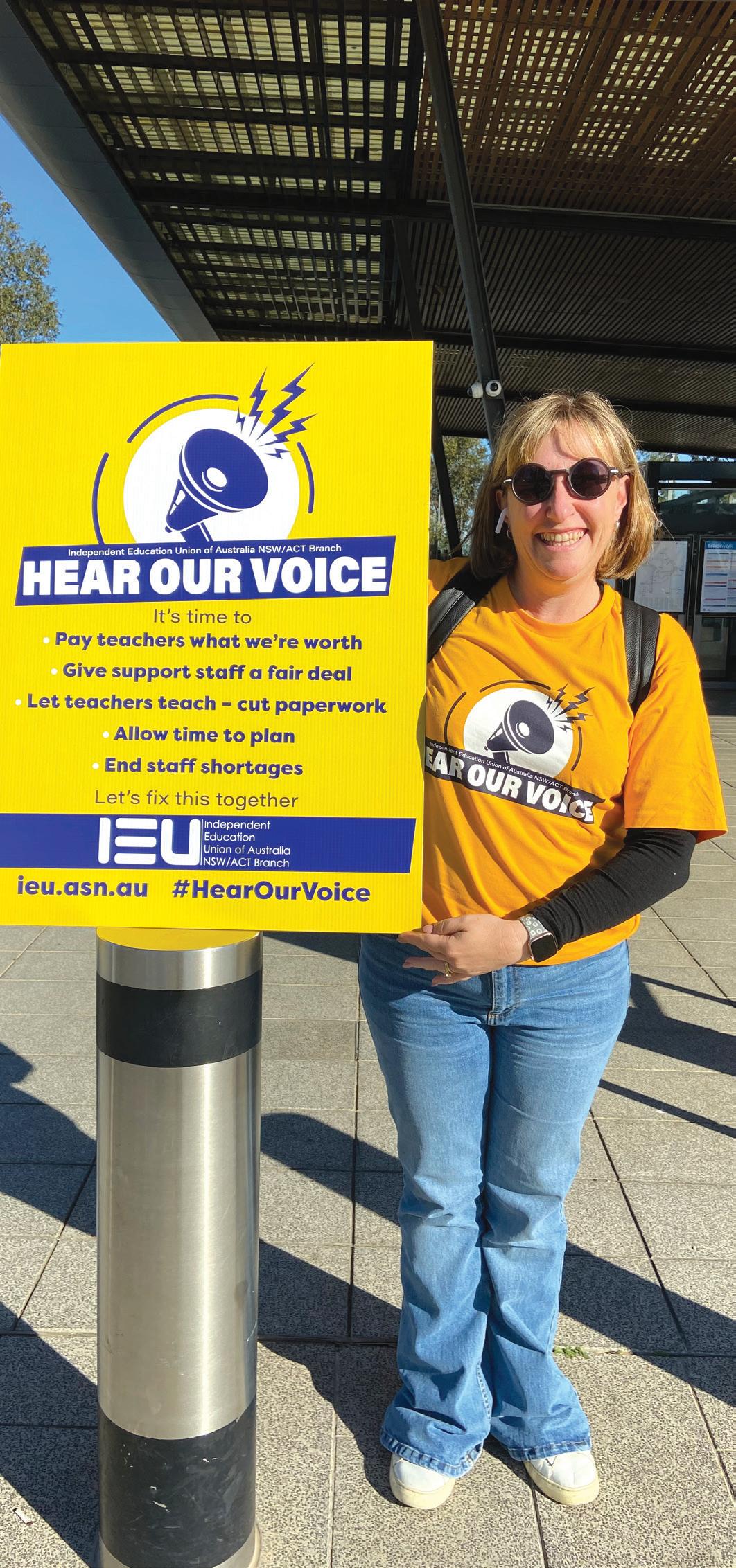
Apart from advocating for better education funding, she is passionate about supporting nurses and the health system.
When she is not running the college’s music department, acting as IEU Rep or vying to represent the seat of Camden, Sally is also the mother of three children aged 14-19, sings at her local church, St Paul’s Camden, and plays in a 1970s-80s cover band called Better Days Band.
The band was formed by a group of dads who met through their children attending St Anthony’s, and Sally asked if she could get involved as a singer.
“We don’t play that many gigs as we’re all so busy, but it’s great fun when we do.”
Sue Osborne Journalist
Friday 17 March
The IEU invites early career teachers (1-3 years out) to join us for a unique opportunity to:
• network with like-minded peers from NSW and the ACT
• share your experience as an early career teacher in 2022
• unpack current or emerging professional issues
• learn about your rights at work
• hear about NESA accreditation processes
• meet your organiser and the union team in the IEU’s Sydney headquarters
• discover the services offered by NGS Super, Teachers Mutual Bank and Teachers Health
• enjoy a special dinner on Friday evening
• stay overnight in Sydney (accommodation provided).
All participants will be invited to join the IEU Council meeting on Saturday 18 March (Council is the union’s decision-making body, bringing together about 100 delegates). We’ll ask five participants to form a panel, take the floor and share with Council what matters most to early career teachers. If you’d like to participate, please email pd@ieu.asn.au by Friday 10 February 2023.
4 newsmonth - www.ieu.asn.au
“The Camden area and its people don’t always get represented the way they should, and I want to change that by being a strong voice in Parliament for the area I cherish so much.”
Principals: Welcome to a year of challenge and opportunity
The education landscape is evolving in meaningful ways, particularly in its shifts during the recent pandemic years.
As the 2023 school year begins, modern technologies and methods of learning provide a unique challenge in adapting our approach to teaching while engaging students in the best means possible, often in difficult circumstances.
Recent research from RMIT purports that technology is no longer a motivating factor in learning – it’s a must. It needs to be incorporated in the future of education to ensure students are equipped with the skills to cope in a world dependent on technology.
Further, with the shift towards a more personalised learner experience, teachers are required to become data collectors, analysts, planners, collaborators, curriculum experts, synthesisers, problem solvers and researchers.
This provides a significant challenge for many principals when managing a limited budget, restricted access to the right hardware and software, and a shortage of staff with the experience and skills to administer and deliver the curriculum.
In the run-up to the NSW election on 25 March, policymakers on both sides of the political aisle will focus on teacher retention, staff wellbeing, salaries and conditions, technology and academic

recovery after the pandemic. They’ll also work on more contentious topics, such as parental rights and LGBTIQ students’ rights.
The IEU Principals’ Sub Branch made a strong contribution to the NSW Parliament’s Inquiry into Teacher Shortages in 2022, and the branch’s involvement in visiting MPs to convey members’ concerns around staff wellbeing, pay, conditions and respect added gravitas to the ongoing education debate.
In engaging with their school colleagues and wider school communities in 2023, the role of principals and educational leaders requires deep commitment to addressing staff shortages, workload
Increase in teacher practicum payments
The IEU and the NSW Teachers Federation reached agreement in November with the Deans of Education at universities to vary the Teacher Education Professional Experience Supervision Agreement 2022, an unregistered agreement, by extending it until the end of 2023. The daily rates for practicum supervision and coordination increased by 3 per cent
from 1 January this year. The new daily rates will be $35.72 for supervision and $1.78 for coordination.
Discussions continue regarding the agreement, considering the reviews of initial teacher education underway at both federal and state levels.
Look after your leave
Congratulations if you secured a new teaching or leadership position this year.
If you moved to a different school but maintain the same employer eg Sydney Catholic Schools or the Catholic Diocese of Parramatta, then you can assume that the balance of your accrued long service leave and personal/carer’s leave remains intact and continuous.

If your new workplace is in a different diocese or if you moved between a Catholic
independent and a systemic employer you may be able to move your leave with you. It is not an automatic process, it involves some administration and form filling.
It needs to be done within 14 days of commencing employment with a new participating Catholic employer. Speak to the business manager or HR manager at your new school and call your IEU organiser (8202 8900) if you need further clarification.
issues and enhancing the status of the profession, all the while maintaining educational integrity for their students.
The IEU acknowledges that huge responsibilities lie at our principals’ doors, and we thank our principal members for their best efforts at this very demanding time.
In a year that has huge potential for change, the IEU looks forward to working with our principal members in 2023 to support them industrially and professionally so they can continue making vital contributions in our diverse educational settings.
IEU will have a voice at National Early Years Summit

IEU Federal Secretary Christine Cooper and Cronulla Preschool Director Janene Rox will represent the union at the Federal Government’s National Early Years Summit at Parliament House in Canberra on 17 February.
The Government’s invitation states the Early Years Summit will start a conversation on developing a Commonwealth Early Years Strategy.
Janene represented the IEU at an ACTU event in Canberra in August last year, where she said she was “fighting for the future of the profession”.
The Government’s invitation says the summit is “developing the strategy to shape our vision for the future of Australia’s children and their families”.
It continues: “Recognising how critical the early years are for children’s development and later outcomes in life, the strategy will aim to create an integrated, wholeof-Commonwealth approach to help ensure children aged five and below, as well as their families and communities, have the tools and supports in place to thrive.
“It is our shared ambition that the strategy will support improved integration and coordination across all Commonwealth programs, expenditure, functions and activities
that impact early childhood development, ultimately supporting better outcomes for young children in Australia and their families.
“The Summit will bring together a diverse range of stakeholders including industry experts, sector leaders, and families/carers. It will focus on: exploring how the Government can best support Australia’s children and their families in the early years • synthesising views on the vision, outcomes and priorities for reform promoting and guiding ongoing engagement in the consultation processes.
“While the strategy’s focus will be on Commonwealth programs and policies to better target investment and maximise outcomes, we recognise the early years system is broad and encompasses reform work and activity underway across all jurisdictions and early childhood sectors.
“We want to ensure the strategy and all Commonwealth early childhood policies are complementary and not duplicative of this support for the early years.”
newsmonth - Vol 43 #1 2023 5
Lyn Caton Principals’ Organiser
Stand with Gomeroi Update on union opposition to Pilliga gas project

On Saturday 14 January, a gathering of Gomeroi people, community members and unionists, including the IEU, convened at Coonabarabran Oval to protest the latest developments in the giant Santos gas project that proposes to drill 850 coal-seam gas wells into traditional lands including the Pilliga forest, and the harms it will bring.

In a strong showing of solidarity, more than 500 people convened to make signs and banners, network, hear speeches, listen to local music and enjoy dance performances.
A delegation of unionists, including the IEU, had already rallied at Narrabri in November 2022: Unions support Gomeroi in pushback on Pilliga gas project
How it started
In May 2021, energy giant Santos filed applications in the National Native Title Tribunal seeking a determination on leases for a $3.6 billion project involving 850 coal-seam gas wells at Narrabri on the NSW north-west slopes. The traditional owners, the Gomeroi people, object to this drilling on their land, including the unique and vulnerable ecosystem of the Pilliga forest.
At the hearing, the Gomeroi people argued that Santos had failed to negotiate ‘in good faith’ by not treating them on an equal footing with the farmers whose land is also within the project area.
In 2014, Santos and gas company AGL did a deal with major non-Indigenous farmer and land-owner organisations promising that if any farmer objected to gas drilling on their land, the energy companies would respect this – they would only drill into lands where farmers agreed and wanted to be paid compensation for allowing the drilling. This deal was never offered to the Gomeroi people.
The Gomeroi people asked the Tribunal to consider whether overriding Native Title rights for the gas-drilling project was in the public interest.

The Gomeroi people argued it would have “devastating consequences for Australia” as it would contribute to climate change, resulting in natural disasters, and therefore the project was not in the public interest.
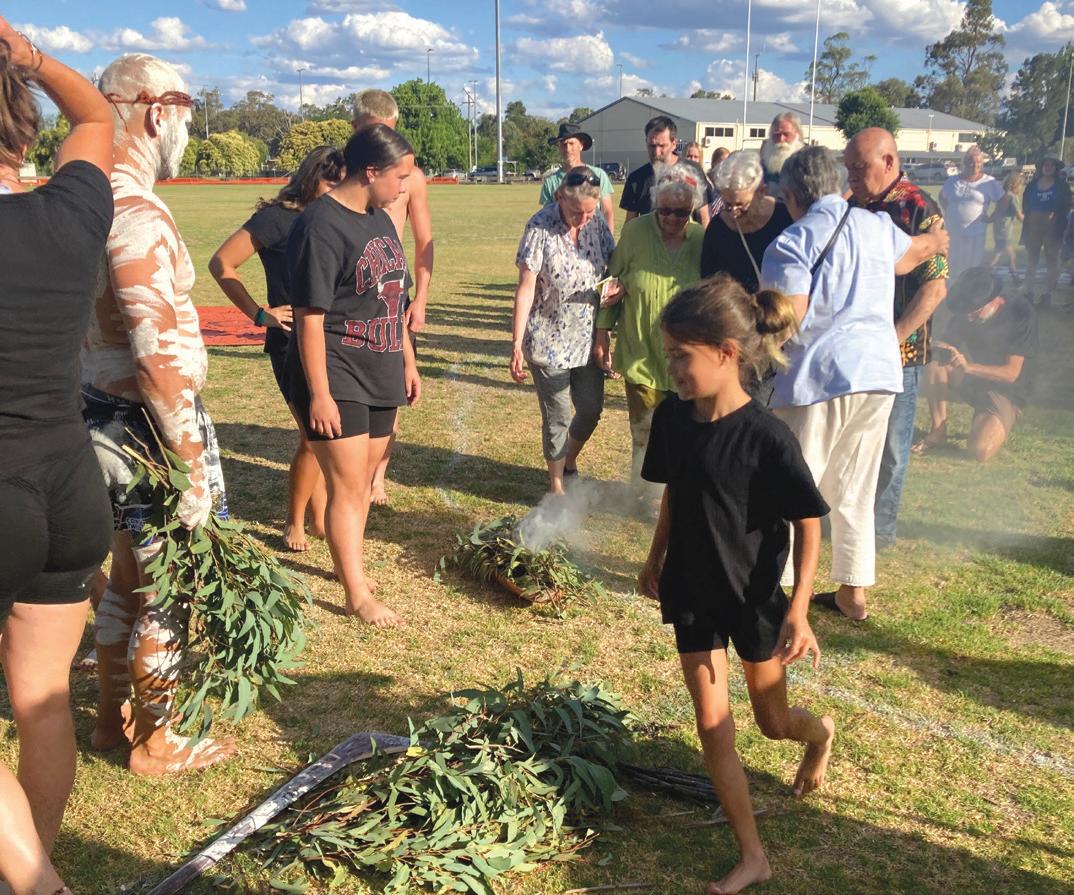

In March 2022, Santos put an offer to the Gomeroi people seeking their consent to drill in exchange for certain benefits. Determined to protect their lands, water and culture, the Gomeroi people rejected the offer.
In December 2022, the Tribunal ruled in favour of Santos’s coal seam gas project.
The Tribunal’s judgement does not discuss climate change in detail, saying this issue had already been dealt with through existing approval processes under the Morrison federal government and the Perrottet NSW government.
Yet there is widespread public objection to the project. The Environmental Impact Statement on the 850 potential gas wells in the Narrabri/Pilliga region attracted a record 23,000 submissions, with 98 per cent opposed to the project.
Pipeline problem
The Santos project also depends on construction of a 423-kilometre underground pipeline from the Narrabri/ Pilliga project to the Hunter region, where it will feed the proposed Kurri Kurri gas plant and connect to the east coast gas distribution system.
Santos bought the Hunter Gas Pipeline from its initial investors in 2022, a sign of its commitment to the project. Many famers and other landowners whose properties will be affected oppose the pipeline, which will threaten not only their land, but important sites and ecosystems. Read more here: Landowners vow to stop gas pipeline project.
NSW Treasurer and Minister for Energy and Environment Matt Kean recently granted permission for Santos to enter private lands to survey for its pipeline despite opposition from landowners, the Gomeroi people and other First Nations people.
This comes after the NSW Government declared the proposed pipeline to be Critical State Significant Infrastructure in December 2022, fast-tracking the Environment Impact Statement assessment process.
The Gomeroi people have appealed the Tribunal’s decision in the Federal Court.
How unionists can help
The trade union movement has long provided crucial support to First Nations people struggling for recognition of their rights to land. Unions fought alongside the Gurindji people who walked off Wave Hill Station in the Northern Territory in 1966 protesting wages and conditions and the return of traditional lands, catalysing the contemporary land rights movement and native title system.
But the current legal framework provides little recognition of those rights. In the Tribunal’s 30-year history, it has only rejected an application by a resource company in favour of First Nations rights three times.
The Commonwealth Attorney-General has the power to overrule any determination by the Tribunal if he considers it to be in the national interest.
Unions NSW has written to Prime Minister Anthony Albanese, Attorney-General Mark Dreyfus, the Minister for Indigenous Australians, Linda Burney, and the Minister for the Environment and Water, Tanya Plibersek, seeking urgent discussions.
Unions NSW is committed to supporting the Gomeroi people in escalating this campaign.
For more information
Sign the petition: https://gomeroingaarr.org
Contact: IEUA NSW/ACT Branch Assistant Secretary David Towson: david@ieu.asn.au
David Towson Assistant Secretary

IEUA NSW/ACT SUPPORTS THE VOICE
6 newsmonth - www.ieu.asn.au
A member of the Gomeroi community applies ochre to IEUA NSW/ACT Assistant Secretary David Towson (above); the Gomeroi people perform a Smoking Ceremony (centre); and dancers from the local Gomeroi community at Coonabarabran Oval (left)
Accreditation: Professional engagement with peak bodies
During January, the IEU held meetings with NESA to consult on the newly released NSW Teacher Accreditation Manual (2022) and its accompanying procedures documents.
In consultation with the IEU and other stakeholders, NESA aims to streamline the accreditation processes for all teachers, regardless of career stage.
The procedures documents contain a series of FAQs to assist teachers, accreditation supervisors, principals and employers to understand their responsibilities under the policy.
The ongoing engagement between NESA and the IEU aims to further refine the guidelines pertaining to internal school processes for recommendations towards Proficient Teacher status, or attestations for maintenance of accreditation at Proficient and the voluntary higher levels.
The IEU believes that accreditation should be an equitable process, regardless of the location of the school or the sector to which it belongs. NESA’s work to provide resource materials, professional development
opportunities and specific guidance to teachers, accreditation supervisors, principals and employers should guarantee an equitable process that maintains the integrity of teacher accreditation without imposing unreasonable workloads generated purely for the purpose of finalising accreditation.
Further meetings with NESA will take place over the next few months.
Members who have not yet had the opportunity to view the new NSW Teacher Accreditation Manual (2022) may like to access it here: https://educationstandards.nsw. edu.au/wps/wcm/connect/f5cf679c-370f-4b77-909a2a0e137bad00/ta-manual-2022.pdf?MOD=AJPERES&CVID=
Independent schools
Teachers in independent schools may be aware that the Association of Independent Schools (AIS) has been considering changes to the Experienced Teacher process.
The IEU has a meeting scheduled with the AIS to discuss the Experienced Teacher requirements, with a view to
encouraging streamlining and a review of the workload implications for teachers wishing to engage with the process.
Compliance
Members may be aware that NESA commenced a review of the current Registrations and Accreditation Manuals for Non-Government Schools during 2022. Some aspects of the review are of concern to members of school leadership teams, as they are focused on the policies and procedures with which a school must comply to achieve and maintain the school’s registration and ability to operate.

Other elements of the manual deal with the compliance requirements for curriculum documentation related to programming, directly impacting teachers.
In recent months the IEU held meetings with NESA to discuss communications with teachers regarding the implications of these changes. These discussions will be ongoing during Term 1. We hope to be able to provide more updates on this work in the next few weeks.
WHS: Know your rights at work
You have a right to a safe workplace under the Work Health and Safety (WHS) Act and your employer has an obligation to provide you with one. Your rights at work and work practices frameworks (where they are in place) still apply in 2023. So here’s a reminder of what to look out for as you start full steam ahead in February.
Teachers
Consider the following as areas of WHS: How many events, or extracurricular events, will you ‘volunteer’ for?
What is reasonable to take on given your teaching load and classroom responsibilities, and the current shortages across schools?
• Through your IEU Chapter, ask why initiatives are being introduced. What is their purpose, and how do they
improve teaching and learning? How much extra release time will you be given to take on and implement initiatives or programs?
• Classes: your timetable should tell you your face-to-face load and duties, and its pro rata allocation if you work part time. Meetings should already be scheduled. If you work in a Catholic systemic school, do you know the limit of meetings permissible under your Work Practices Agreement?
Annual big-ticket or whole-school events – most should be published already and known to you. Consider what is reasonable to take on above and beyond your teaching load.
• Professional development should be undertaken during work hours and, if possible, be accredited by NESA.
Support staff
Work your hours – anything asked of you outside of those is overtime. However, remember that your employer needs to pre-approve overtime for you to be able to claim it.
Take your breaks – you are entitled to them.
Extra duties – if you are asked to perform extra duties such as providing first aid, ensure you are paid the allowance.
Classification – make sure it is correct and depending on your role, check that you are progressing through the steps for each full-time year worked or equivalent.
Higher duties – if you are performing higher duties for a period, check if your EA has allowances.
Professional development should be offered to you, and during work hours.
Think about your physical safety when you are putting up classroom displays, hanging materials or moving furniture, and if it is heavy or high, ask for help. It is important to maintain your safety rights.
Stay up to date with union news, and protect your colleagues by inviting them to join the union.
As always, if in doubt, give your union organiser a call: 8202 8900.
Lubna Haddad Organiser
newsmonth - Vol 43 #1 2023 7
Learn more about inclusivity at Diversity in Education Conference
The Diversity in Education Conference is hosted by the Australian Education Union (AEU) and the NSW Teachers Federation, with support from Education International. It is a teacher union-focused event.
The conference is an international LGBTQ+ forum for educators to create awareness and understanding of gains and challenges facing LGBTQ+ workers within schools, and an opportunity to build community.
The conference is on Tuesday 28 February 2023, at NSW Teachers Federation House Auditorium (37 Reservoir Street, Surry Hills), the day before the Sydney World Pride Human Rights Conference.
Outline
The Conference aims to increase awareness of social justice issues facing
LGBTQ+ communities within schools, as well as demonstrated pathways to achieve legal and policy reform.
The conference will have a global focus, including capacity building, sharing stories and experiences as well as information sharing to build solidarity and grow our education union movement.
The conference will also aim to connect participants with others who have various experiences from around the world.
The conference will cover the following:
• community and culture
• justice and freedom
• visibility and inclusion.
Community and culture
What does education look like for LGBTQ students? How far have we come? Are we regressing? What is the impact of antiLGBTQ groups on education?
Examples of how this is being addressed
and how we can organise around this. What are the social justice issues facing our communities in schools, and how legal and policy reform has assisted/could assist to address areas of concern?
Justice and freedom
Discussion will include: How to create safe learning environments for students and working environments for teachers. Could include examples of effective programs.
• How do teachers cover human rights? LGBTIQ rights in the curriculum with the various legal and cultural frameworks operating in various countries. What legal/ethical/moral/cultural frameworks exist for educators in various countries and how does this affect LGBTIQ teachers in their work?
Visibility and inclusion
Discussion will include:
Visibility at work, opportunities to be authentic in working lives
Celebration of LGBTQ days/ people / culture at work.
Registration
Email pd@ieu.asn.au to obtain a promotional code to register for the conference. When purchasing your ticket, you start by adding a $400 ticket to the cart. On the next page, enter the promotional code. The price will then revert to $250.
Registrations are now open: AEU Diversity in Education Conference | Pride Amplified. Cost for IEU/Federation members: $250; non-members: $400
Present tense International student sector recovery continues
Welcome to another year of Present Tense, your window into the private post-secondary education sector.
The international student sector continues its recovery from the dark days of border closures and calamitously low student numbers during the pandemic. English Australia reported in their December Market Analysis of the big increases in student numbers in the latter part of 2022.
Overall, ELICOS commencements increased by 100 per cent on the same time in 2021, while new enrolments also increased, by nearly 45 per cent.
Colombia has become the single biggest source of students, with an increase of over 4000 students (nearly 150 per cent), while numbers from Thailand have also been booming. Numbers from China, the traditional drivers of the industry, continue to struggle, though the end of lockdown arrangements in that country may see those numbers improve in 2023.
International student numbers in Australia declined sharply in the wake of the pandemic-era border closures, but numbers have seen a steady improvement since Australia’s international borders re-opened in December 2021. Before the pandemic there were over half a million international students living in Australia, but this number halved by the time the border reopened, and had only recovered to about 370,000 by October last year.
Presumably numbers will further improve this year, but it may be another year before numbers are back to where they were in 2019.
Bargaining update
Your union continues to seek improvements for members in the post-secondary education industry through the enterprise bargaining process. For much of 2022, the IEU, alongside our sister union the NTEU, was bargaining at UoW College, the pathways colleges of the University of Wollongong.
These negotiations concluded just before Christmas, with an agreement to improve wages by around 10 per cent over the three years of the agreement, along with some improvements in other areas of concern, such as academic subject coordination. The agreement was endorsed by staff in January and has been submitted to the Fair Work Commission.
Bargaining will soon commence at three other employers with a lot of IEU members. The first of these is Taylors College, who run the pathways programs for the University of Sydney. These negotiations are at an early stage, and while the parties are still some way apart on some issues, there are other areas where agreement should be reached quickly. In the next few months, negotiations will also start at Navitas Futures (formerly Navitas English), as well as Navitas English Services, the ELICOS arm of the Navitas group.
The Fair Work Act includes provisions for ‘good faith bargaining’, under which an employer can be compelled to bargain where it can be demonstrated that most employees (or group of employees, such as teachers) want
that to happen. Some of the bargaining provisions in the Act were strengthened by changes that passed through parliament late in 2022. To find out how this might work at your workplace, contact your union.
From the international desk
In January, El Gazette reported that 1400 English language teaching assistants, recruited by the provincial government in Valencia, Spain to work in schools, have not been paid. Most of these assistants are recruited from outside the EU, and so have no residency or work rights, and so many have returned home.
This looks like a short-sighted approach in Valencia (not to mention disgraceful), as El Gazette is also reporting that there is currently a world-wide shortage of ESL teachers, with countries as diverse as New Zealand, Canada and Malta scouring the world for practitioners.
Australia also has a teacher shortfall, and with student numbers on the increase, it could be a good time to return to the industry for those who’ve left. And it would also be a good time for employers to have a good hard look at what they are offering potential employees!
Kendall Warren Organiser
8 newsmonth - www.ieu.asn.au
The new online open AI tool ChatGPT can competently answer assignment questions, write essays and even answer and create multiple choice questions.
The chatbot was opened to the public in November 2022, and in less than a week surpassed the one million users mark, with people using it for things like creating code and writing essays. (Forbes, 18 January 2023)

ChatGPT is a large language model that is trained on huge amounts of existing written material. This is a type of deep learning software presented as a chat window into which the user inputs a question or keyword or phrase.
GPT stands for generative pre-trained transformer, which is a program that can write like a human.
GPT essentially searches a massive amount of written text by reading millions of articles and books online. It produces work that has perfect grammar, correct punctuation, and no spelling mistakes. After analysing a text based on users’ input it then captures the style of writing for all new articles.
(The Focus, December 2022)
Public schools in NSW have banned students from using the tool, but so far independent and Catholic schools have not followed suit, saying teachers will be able to spot students who are using the software.
Is a robot doing your student’s assignment?
The NSW Department of Education’s Acting Deputy Secretary for Learning Improvement, Megan Kelly, said the ban in government schools would be in place while a review was under way.
“The Department of Education will be restricting student access to generative AI applications, including ChatGPT, on student devices or using their own device on the department’s network,” she said
Sydney Catholic Schools Chief Executive Tony Farley said there would be no blanket directive to ban ChatGPT at the 149 schools in his diocese, while the Diocese of Parramatta also has not issued a ban. (Sydney Morning Herald 22 January 2023)
One IEU member from a north shore independent said he’d tested the tool, and it had accurately answered a set of short answer questions at HSC level Economics. He said he was not sure how a ban on students using the software would work.
“How do you monitor what they’re doing at home? Take home assessments in some key learning areas are becoming pretty much a thing of the past anyway,” he said.
“Is ChatGPT any different from a student’s private tutor completing their take home task?”
Professor Matt Bower in the School of Education at Macquarie University, who specialises in the innovative use of technology for learning purposes, said the public release of ChatGPT constitutes “a major disruption to education at all levels”.
“You can ask ChatGPT to ‘explain key factors that increase risk to infectious disease’, or ‘argue the advantages of capitalism over socialism’, or ‘write a computer program in Python that finds the first n prime numbers’ and the platform will provide seemingly intelligent responses,” Professor Bower said, as he sounded a warning about implications for assignments and homework.
Look out for the next edition of IE in March for more on ChatGPT.
Sue Osborne Journalist
A warm welcome to 2023. We hope you’ve returned to your workplace refreshed after the break, ready for the year ahead, and that you can still find everything you’re certain you left on your desk before the holidays – we’re still looking for our stapler!
Last year was a busy and exhausting one but one in which more than 5000 new members joined us.
This has been our highest join number since Covid started, and signals a strong future for the union.
To those members who have already renewed, thank you for your ongoing support and for being so organised. For those who are yet to renew, if you can’t find your original email, please let us know via membership@ieu.asn.au
We are happy to resend or you can call us to update: 8202 8900 – press 1.
Our annual Member Update will be sent to Chapter Reps this month. Please check in with your workplace Rep to confirm that your details are correct. Updating your information with us ensures you are attached to the correct chapter, that you are paying the rate applicable to your workload and you can exercise all union benefits available to you, including voting rights.
We look forward to assisting you in 2023.
Membership Team
New IEU office in Canberra
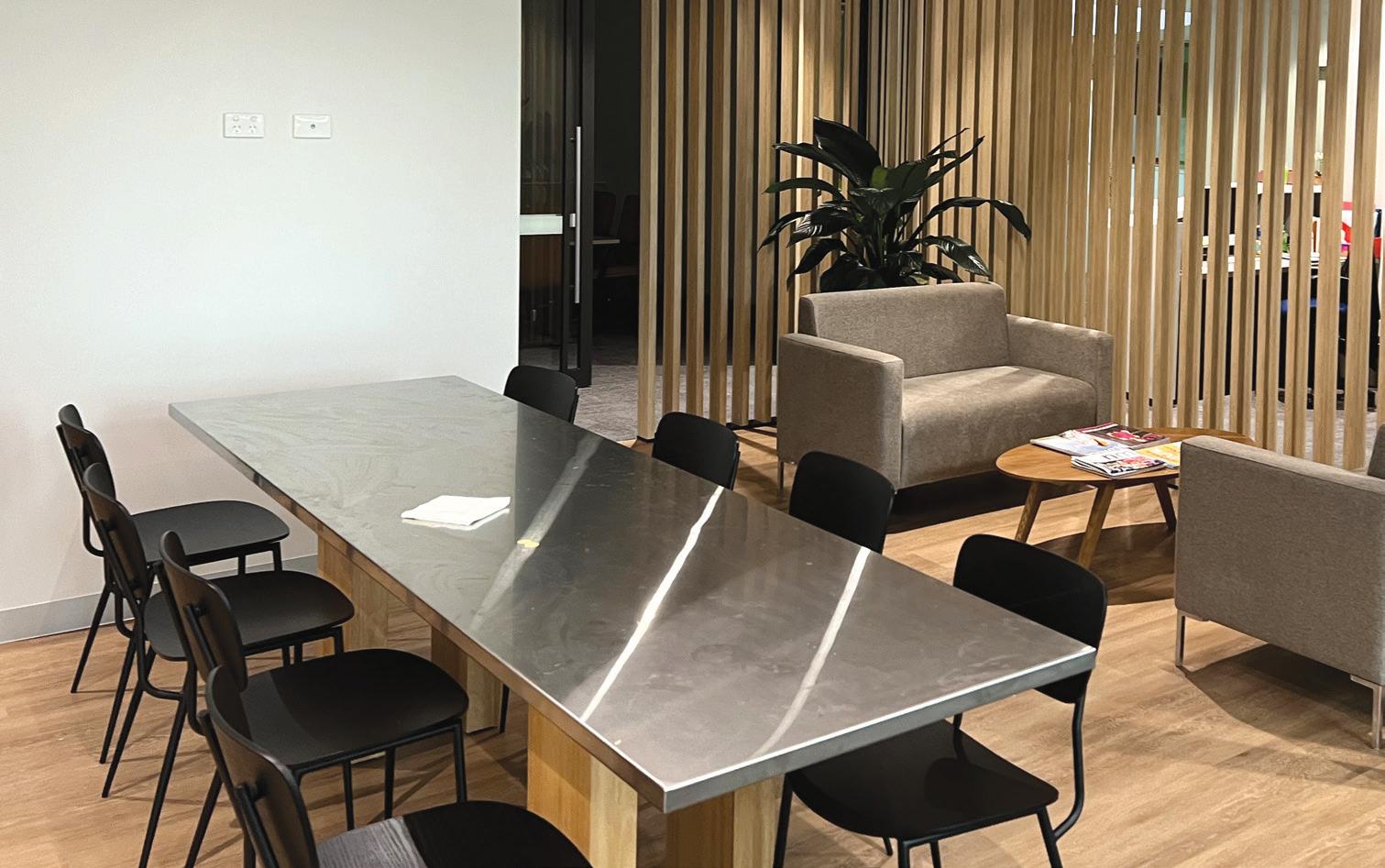


newsmonth - Vol 43 #1 2023 9
The
12, 3-5
will enable our organisers to better serve the ACT, the south coast and south west of NSW. Phone: 6120 1500
IEU will open its new office in Canberra in March. The new premises, Units 11 and
Phipps Close, Deakin, will be open to all members, and
Independent Education Union of Australia New South Wales/Australian Capital Territory Branch ELECTION NOTICE - E2022/191
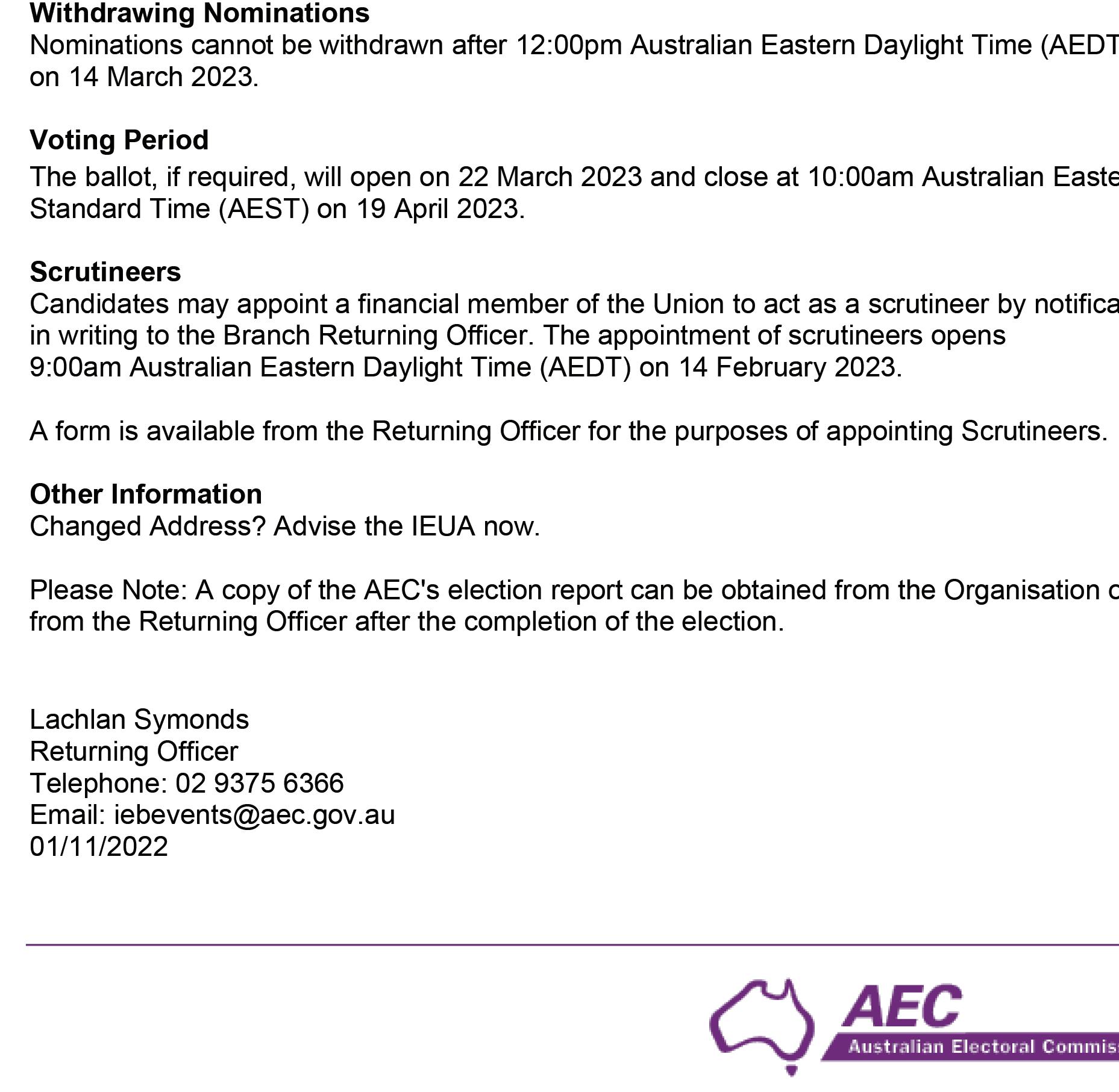
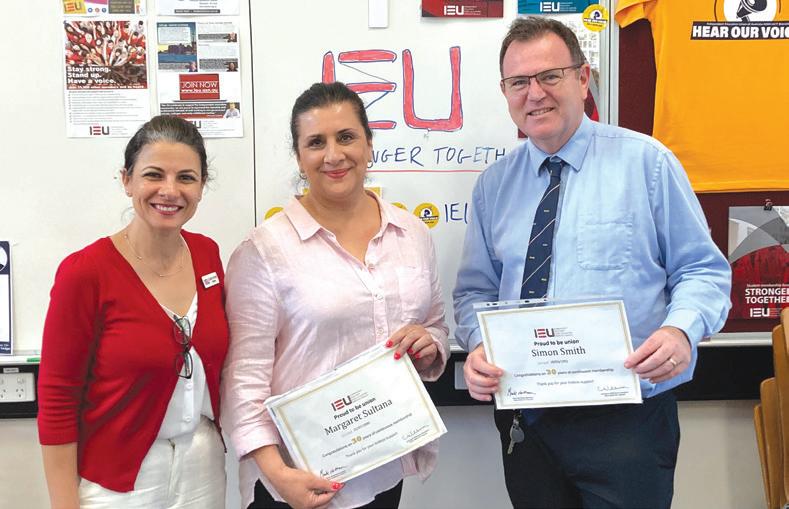
Insufficient Nominations Election
Fair Work (Registered Organisations) Act 2009
Nominations are called for:
Central Coast Sub-Branch
- Branch Council Delegate (1)
Central Metropolitan Sub-Branch
- Branch Council Delegate (3)
Cumberland Sub-Branch
- Branch Council Delegate (2)
Ku-Ring-Gai Sub-Branch
- Branch Council Delegate (5)
Metropolitan East Sub-Branch
- Branch Council Delegate (4)
Mid North Sub-Branch
- Branch Council Delegate (1)
Northern Beaches Sub-Branch
- Branch Council Delegate (5)
Northern Suburbs Sub-Branch
- Branch Council Delegate (6)
Penrith / Blue Mountains Sub-Branch
- Branch Council Delegate (1)
Principals Sub-Branch
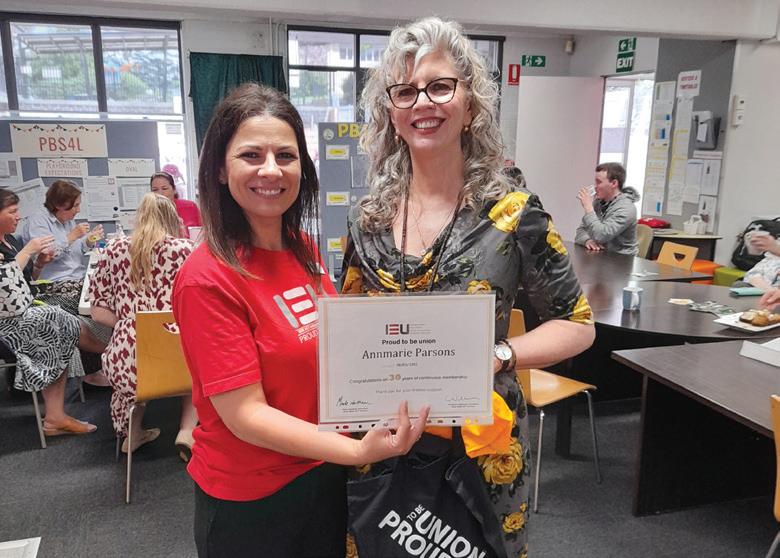
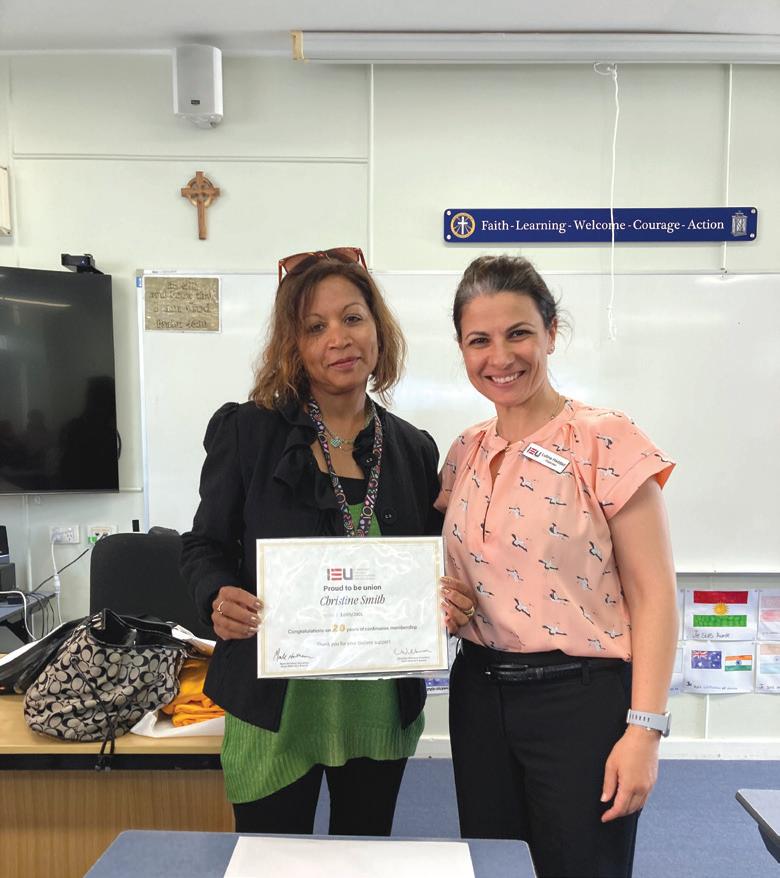
- Branch Council Delegate (2)
South Coast Sub-Branch
- Branch Council Delegate (3)
Southern Suburbs Sub-Branch
- Branch Council Delegate (5)
Nominations, which must be in writing and comply with the registered rules of the Organisation, may be made at any time from 14 February 2023
Additional forms are available from the Returning Officer.
Prospective candidates and nominators should verify their financial status and any other qualifications required by the Organisation's rules prior to lodging nominations.
Nominations must reach the Returning Officer via the lodgement method(s) stipulated below no later than 12:00pm Australian Eastern Daylight Time (AEDT) on 7 March 2023
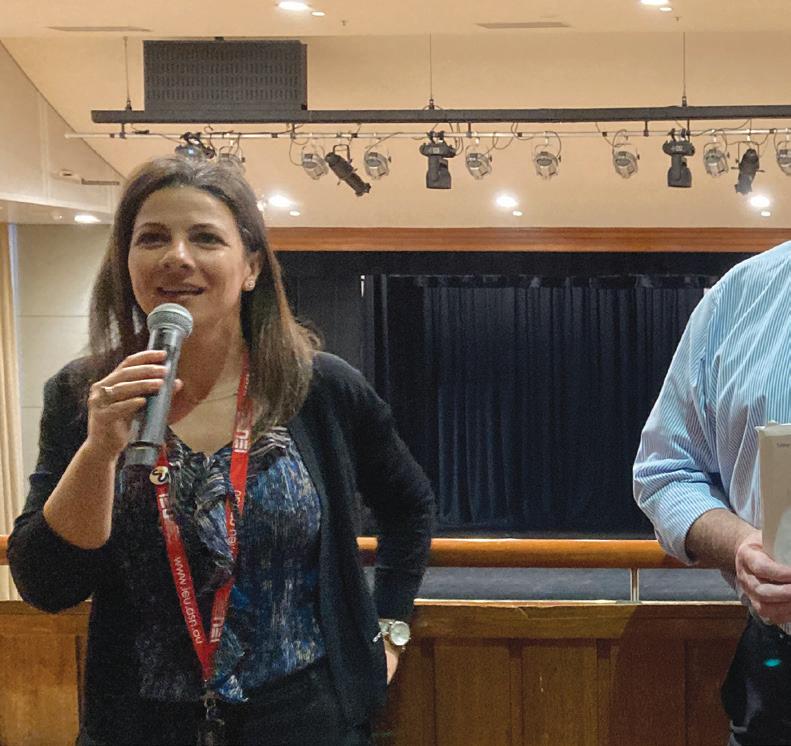
How to lodge nominations, nominations must be lodged via the following method(s):
By Portal: Australian Electoral Commission Portal, www.aec.gov.au/ieb/
By Email: A properly completed nomination form including all necessary signatures and attachments may be scanned and submitted as a pdf file to IEBnominations@aec.gov.au

PLEASE NOTE:
1. Emails to the AEC inbox that appear to be spam may be blocked. It is the responsibility of senders to ensure that their email reaches the AEC before the deadline for nominations.
2. In order to be able to be received by the AEC, emails (including attachments) should be no greater than 6 MB in size.
3. You may call 02 9375 6366 to enquire about the status of your nomination.
10 newsmonth - www.ieu.asn.au UNION
Di Jones (in white t-shirt) of Good Shepherd Primary membership badge from Rep Bernadette Aitken
30-year IEU membership badge recipients Margaret Sultana (centre) and Simon Smith of St John XXIII Catholic College, Stanhope Gardens, with IEU Organiser Lubna Haddad
Annemarie Parsons of Christ the King Primary School, North Rocks, receives her 30-year IEU membership badge from IEU Organiser Lubna Haddad
Peter Bowd and Christine Hackett (right) of Our Lady 30-year IEU membership badges from IEU Organiser
20-year IEU membership presentation to Christine Smith (left), of Nagle College, Blacktown, by IEU Organiser Lubna Haddad
UNION SNAPS
Join the IEU and win

Catherine
Independent Education Union of Australia (IEUA) New South Wales/Australian Capital Territory Branch ELECTION NOTICE - E2022/207

Casual Vacancy Election
Fair Work (Registered Organisations) Act 2009
Nominations are called for:
North Coast Sub-Branch - Branch Council Delegate (1)
Nominations, which must be in writing and comply with the registered rules of the Organisation, may be made at any time from 14 February 2023.
Additional forms are available from the Returning Officer.
Prospective candidates and nominators should verify their financial status and any other qualifications required by the Organisation's rules prior to lodging nominations.
Nominations must reach the Returning Officer via the lodgement method(s) stipulated below not later than 12:00pm Australian Eastern Daylight Time (AEDT) on 7 March 2023.
How to lodge nominations, nominations must be lodged via the following method(s):
By Portal: Australian Electoral Commission Portal, www.aec.gov.au/ieb/
By Email: A properly completed nomination form including all necessary signatures and attachments may be scanned and submitted as a pdf file to IEBnominations@aec.gov.au
PLEASE NOTE:
1. Emails to the AEC inbox that appear to be spam may be blocked. It is the responsibility of senders to ensure that their email reaches the AEC before the deadline for nominations.
2. In order to be able to be received by the AEC, emails (including attachments ) should be no greater than 6 MB in size.
3. You may call 02 9375 6366 to enquire about the status of your nomination.
Withdrawing Nominations
Nominations cannot be withdrawn after 12:00pm Australian Eastern Daylight Time (AEDT) on 14 March 2023.
Voting Period
The ballot, if required, will open on 22 March 2023 and close at 10:00am Australian Eastern Standard Time (AEST) on 19 April 2023.
Scrutineers
Candidates may appoint a financial member of the Union to act as a scrutineer by notification in writing to the Branch Returning Officer. The appointment of scrutineers opens 9:00am Australian Eastern Daylight Time (AEDT) on 14 February 2023.
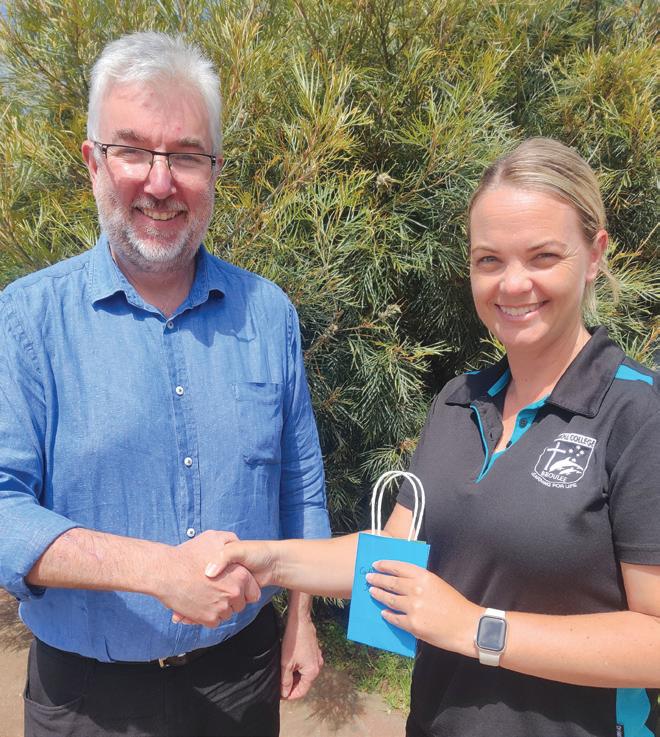
A form is available from the Returning Officer for the purposes of appointing Scrutineers.
Other Information Changed Address? Advise the Independent Education Union of Australia now.
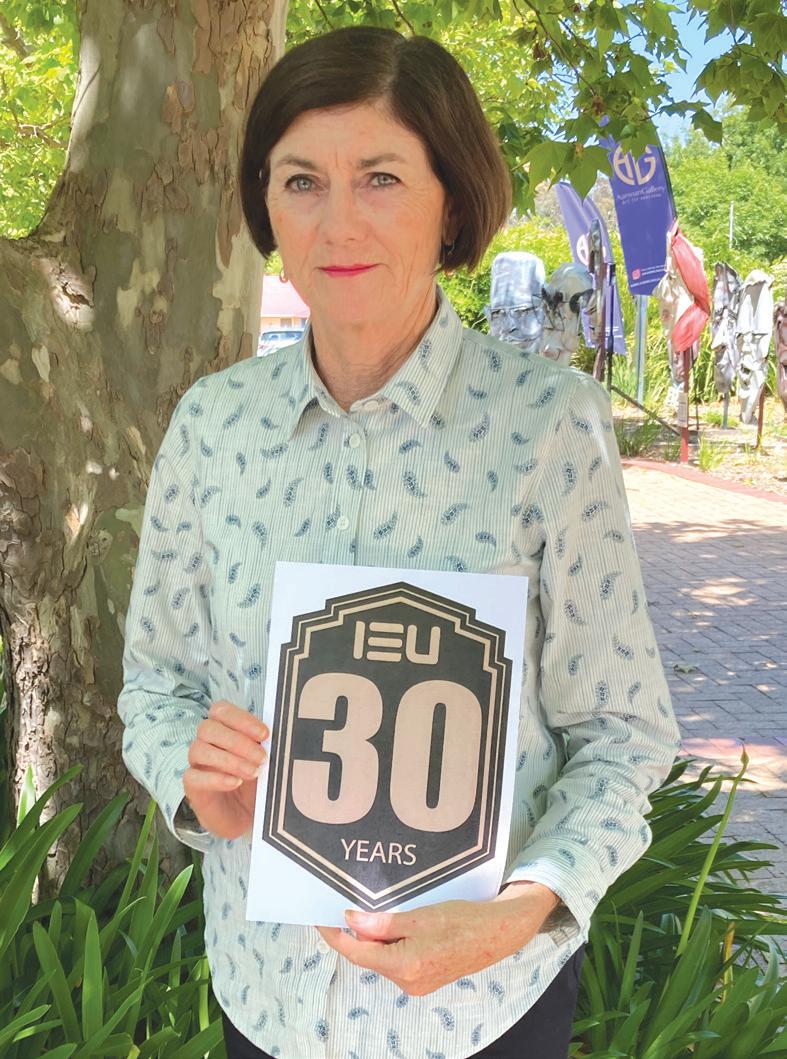
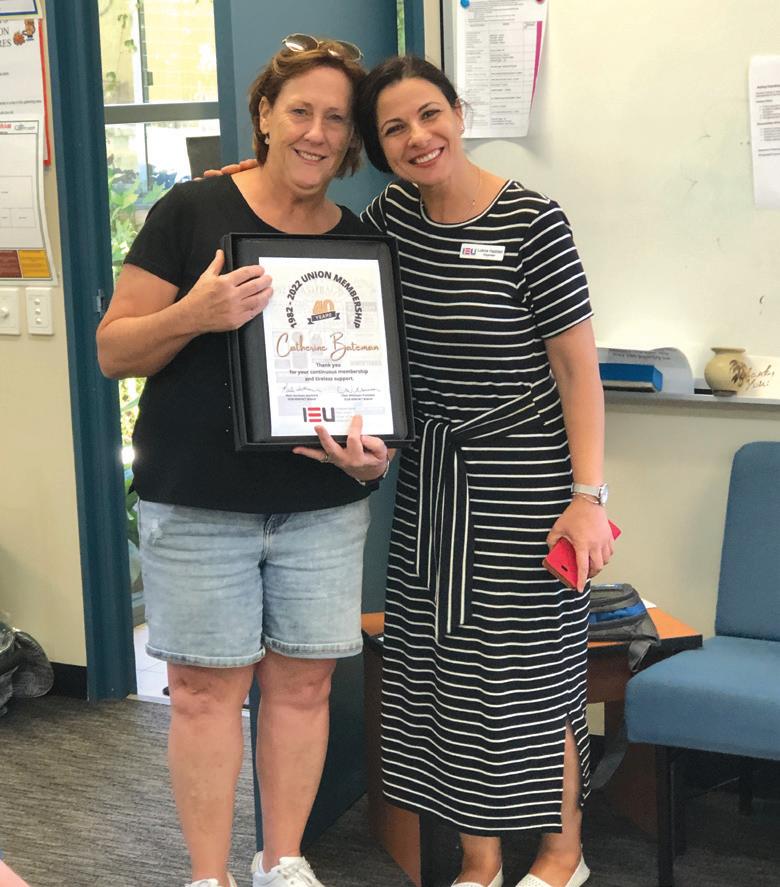
Please Note: A copy of the AEC's election report can be obtained from the Organisation or from the Returning Officer after the completion of the election.
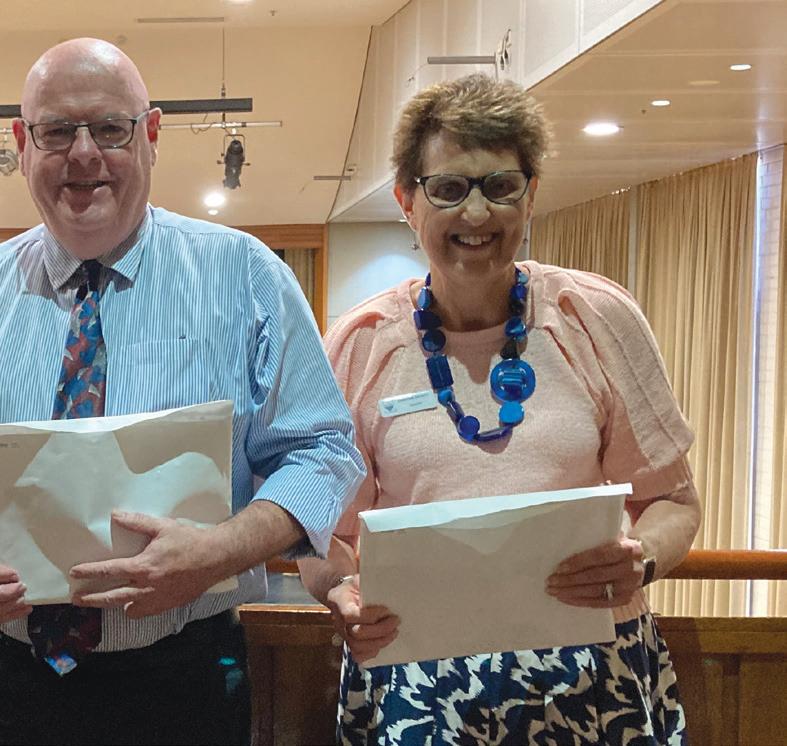
Lachlan Symonds
Returning Officer Telephone: 02 9375 6366
Email: IEBevents@aec.gov.au 23/12/2022
newsmonth - Vol 43 #1 2023 11
Davis from Carroll College Broulee receives the monthly prize ($100 gift card) from IEU Rep Wayne Foster for completing the IEU new member survey, sharing with us what prompted her to join the union. The winner is selected each month using a random number generator.
Primary School, Amaroo, receives her 30-year Aitken (second from right)
Lady of Mercy College Parramatta receive their Organiser Lubna Haddad
Leticia Young, retired member (previously at St John the Apostle Primary School, Florey) receives her 30-year IEU membership badge
Catherine Bateman (left), IEU Rep at St Angela’s Primary School, Castle Hill, receives her 30-year IEU membership badge from IEU Organiser Lubna Haddad
Study backs stronger support for early career teachers
Attracting and retaining teachers remains a major issue for Australia’s education sector, particularly as a high percentage of early career teachers leave the profession in their first few years.
Now, a new University of South Australia research project hopes to boost retention of early career teachers by investigating how improved induction programs can better support new teachers in the classroom.
Funded by a 2023 Australian Research Council Discovery grant of $371,000, the study will prioritise ‘precariously employed’ early career teachers – those on casual and short-term contracts – to effectively manage student classroom behaviour.
Sixty per cent of new teachers are employed on contracts of less than one year or as casual teachers and it can take years to secure long-term employment.
career teachers, and something that could be better accommodated through a thorough and ongoing induction process.
“Finding ways to better support, guide and coach new teachers as they start their careers is imperative for Australia’s education sector.”
According to the Australian Institute for Teaching and School Leadership, induction programs should be school-based and practice-focused to develop teaching skills. They should be embedded in daily practice, and delivered over two years.
“The Australian Guidelines for Teacher Induction emphasise mentoring embedded in daily practice, regular interactions with school leaders, as well as access to targeted professional learning, and extra time allocation for planning,” Professor Sullivan said.
On 1 February 2023, up to 300,000 teachers in England and Wales took strike action. Members of the National Education Union (NEU) are demanding a 12 per cent pay rise that factors in inflation and that is fully funded by the government (not drawn on existing school budgets).
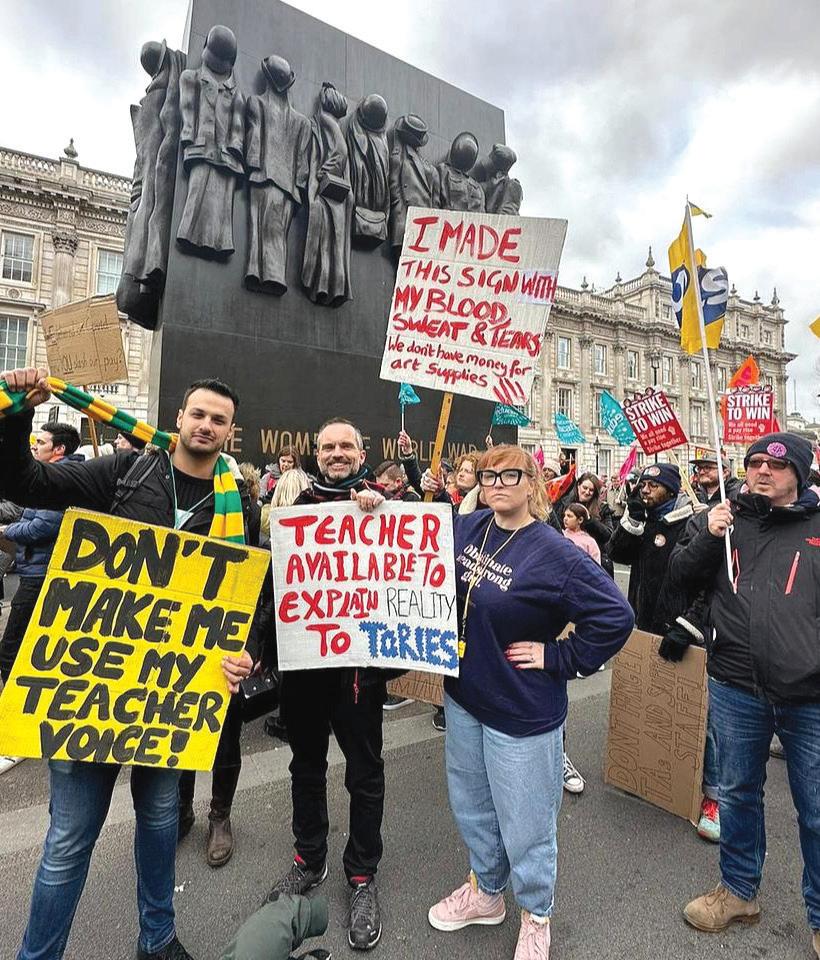
The NEU is the largest education union in the UK and the 1 February strike is the first of seven days of industrial action taking place ending on 16 March. The NEU ballot closed on 16 January and was the largest vote for strike action across any sector since anti-union laws were imposed in 2016. The laws demand that all ballots meet a 50 percent-plus threshold. The ballot by fellow teacher’s union NASUWT narrowly failed to meet the threshold.
NEU joint general secretaries Kevin Courtney and Dr Mary Bousted met with Minister for Education Gillian Keegan in closed discussions in the lead up to the strike. On the picket line in south London, Dr Bousted said “I think that [ministers] believed that we wouldn’t make the threshold for action. I think if it comes to ministers against teachers, teachers will win.”
“Today we put the education secretary on notice. She has until our next strike day for Engand, February 28, to change her stance.”
The strike was part of a bigger “mega” strike with up to 500,000 workers taking to the streets. Teachers joined train and bus drivers, civil servants, university staff and security personnel who are all impacted by the cost of living and by deteriorating work conditions. In London alone, 40,000 march on Downing Street. More than half of state-
funded schools in England were partially or fully closed due to the strike while nearly all school in Wales were closed.
School support staff joined the strike in Wales while teachers took action in Aberdeen and Clackmannanshire in Scotland. Members of the Educational Institute of Scotland (EIS) will continue rolling strike action and walk out each day in two local authority areas until 6 February. In Northern Ireland, members from NASUWT – The Teachers’ Union will take a half day strike on 21 February over the failure to offer teachers a fair and decent pay award.
NASUWT is also calling for a fully funded 12 per cent pay award for 2022/2023.
“At a time when teachers are facing the biggest squeeze on their finances in a generation, offering what amounts to a further real-terms pay cut is simply not good enough. The Department of Education and employers must bring forward a substantially improved pay offer if they want to see an end to this dispute.” Dr Patrick Roach, NASUWT General Secretary IEUA NSW/ACT stands with teachers and support staff in the UK and around the world as they continue to advocate for a better deal. The teaching profession is not just in crisis here in Australia but in many countries due to the rising cost of living and crippling teacher shortages driven by low pay and poor working conditions. Our struggle is their struggle.
Around the Globe brings you international news about injustices and workers’ rights. If injustice exists anywhere, it exists everywhere.
Chief investigator, UniSA’s Professor Anna Sullivan says the study will propose alternative policy and induction practices that better support the transition of insecure replacement teachers within the profession.
“In Australia, there is a focus on school-based induction programs, and while these may be very good, most early career teachers tend to be employed for short periods, so they miss out on a proper induction,”
Professor Sullivan said.
“As a result, these new teachers may be left feeling unsupported, isolated, and lacking confidence in their abilities, increasing the likelihood of them leaving the profession.

“Learning how to manage student behaviour is one of the most important teaching skills, yet it’s also one of the top-ranked challenges faced by early
“Yet most new teachers do not qualify for such induction programs because they’re employed on a casual or short contract.
“Therein lies the conundrum. Newly qualified teachers need a comprehensive induction program, yet their employment status doesn’t enable this.
“Our project aims to find ways to change this so that we can attract, retain and better support new teachers; we must address this issue if Australia is to build a healthier education system.”
Expected outcomes of this project include alternative policy and practice recommendations to support the transition of insecure replacement teachers within the profession.
12 newsmonth - www.ieu.asn.au
NEU members in London take to the streets. (Image: National Education Union, Twitter)
We will achieve great things together Change is in the air
Tina Ruello President


Welcome to 2023; a year in hopeful anticipation of gains, growth and gumption!

There is change in the air and our union is riding the tailwind. We can be confident that this year our union will make change happen. Our collective, galvanised action will get us there, because we are the union and this is our year. Who wouldn’t want to be part of this great organisation?
So Term 1, have those convivial conversations with colleagues about why being part of the union is a good thing. Have a chat to non-members, lapsed members, early career teachers, new support staff – explain our gains, growth and gumption of recent years. Spread the optimism that the union can be the solution to those niggling issues at the start of the year: timetables; contracts; classifications.
Best wishes to new teacher-members who have joined the profession – you are valued and important and instrumental in your role in educating and shaping the generation of tomorrow. The union is here to keep you sane and supported. To support staff members – we recognise the invaluable work you perform that is not in isolation to the work performed in classrooms. The union will strive to maintain the dignity of your labour.
It’s going to be a busy time and the IEU Executive is ready! Have a good term.
Bernadette Baker Vice-President Systemic
Welcome to another invigorating school year. I hope that everyone was able to have down time and restore the mental balance somewhat. In my holiday list of to-do items, was the necessary clean out and cull.
Among the papers was an article from my local newspaper in March 2000, where I was encouraging teachers to attend a joint rally in Sydney. I remember that day so clearly. The camaraderie and sense of purpose was so strong – same as 2022 when we
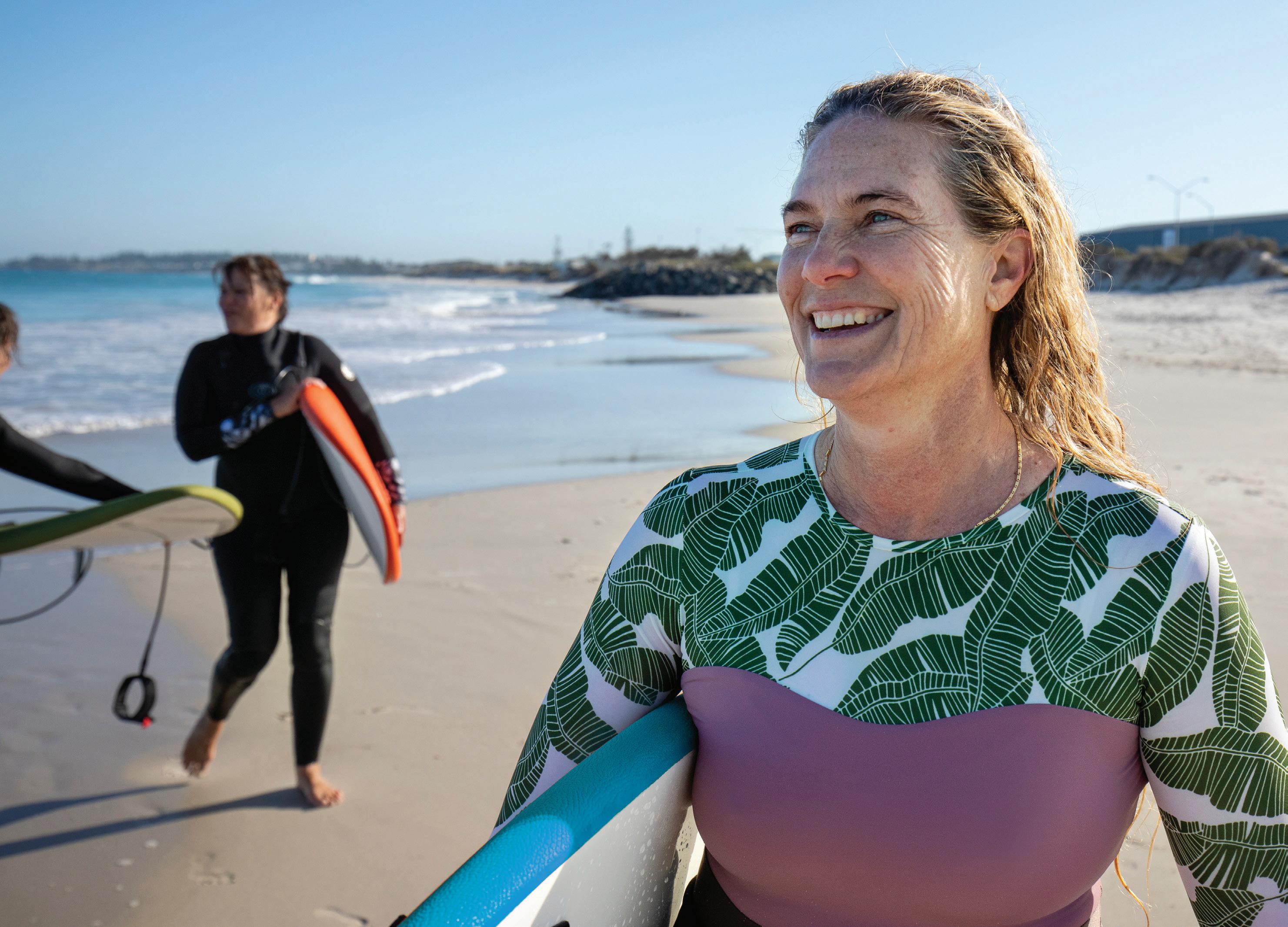
Support staff
Kylie Booth-Martinez Vice-President Support Staff

The 2023 school year is here and it is time to get back into it. I’m very excited to be back with our students with a hit of nerves as to what the new year will bring.
The Cambridge Dictionary’s definition of support staff is “the people that work for an organisation to
rallied with NSW Teachers Federation members. Unfortunately, the issues are still similar.
This year is going to prove yet again we will need to stand together and maintain our voice so that employers will hear the concerns of their employees.
The pay cap enforced by the NSW Government hampers our salary outcomes; the shortage of teachers and high vacancy rates affects the staffing of schools and student outcomes; teachers are teaching outside their area of expertise, there are large class sizes and high temporary employment.
Collectively, we can and will achieve a lot. After all, it’s what we do, it’s who we are. Stand strong, speak up, hear our voice.
keep it running and to support the people who are involved in the organisation’s main business”
The fight is still needed for support staff across our dioceses, especially for senior administration staff in our regional primary schools with enrolments under 400 students. And our Aboriginal Education Officers – the work they do for what they’re paid isn’t right!
I’m looking forward to continuing the fight for all support staff. In the words of my predecessor, Carolyn Collins: “We need to be a force to be reckoned with! Stand for justice for fair wages, manageable workloads and proper recognition for all support staff.”
Let’s keep the work going that is required and I hope the beginning of the new school year is a positive and good one for you all.
11-month term deposit rate for Members*
newsmonth - Vol 43 #1 2023 13 Your money deserves great rates! 4.25
tmbank.com.au/accounts/member-term-deposit % p.a. *Membership eligibility and T&Cs apply. All interest rates quoted are subject to change without notice. Minimum term deposit $1,000. Teachers Mutual Bank is a division of Teachers Mutual Bank Limited ABN 30 087 650 459 AFSL/Australian Credit Licence 238981 | BE02096-TMB-1122-IEU
A force to be reckoned with
Why 2023 is the year to sort out your superannuation Advice from Australian Unions
We’re always paying attention to our wages: how much comes into our bank account and when, making sure we’re getting decent pay increases each year, and saving up where we can.
But it’s rare we give our superannuation the same attention. It’s time to change that.
Retirement may seem a long way down the track but the money you need for a decent retirement cannot be accumulated overnight. It pays – literally – to get on top of your super sooner rather than later.
We’ve made this checklist to sort out your super in four steps.
1 Avoid doubling up on fees
It is easy to accumulate more than one superannuation account – sometimes even with the same super fund.
Often this happens when you start a new job and instead of providing your existing account details, you sign up for a new account as part of the paperwork you do when starting a new role.
If you have more than one account, that often means you’re paying unnecessary fees. (Some people, though, have good reasons to have more than one account including for insurance purposes or to meet some financial goal.)
A good way of consolidating your super is to go to your industry super funds’ website and get them to do it for you. You can also check through your MyGov to see if there’s more than one account in your name and under your tax file number.
2 Learn about default industry super funds
A big part of why unions fought for superannuation is to ensure that superannuation funds, and the services they provide, are suited to your industry. If you have joined a new workplace, there’s a good chance that your default fund is an industry super fund.
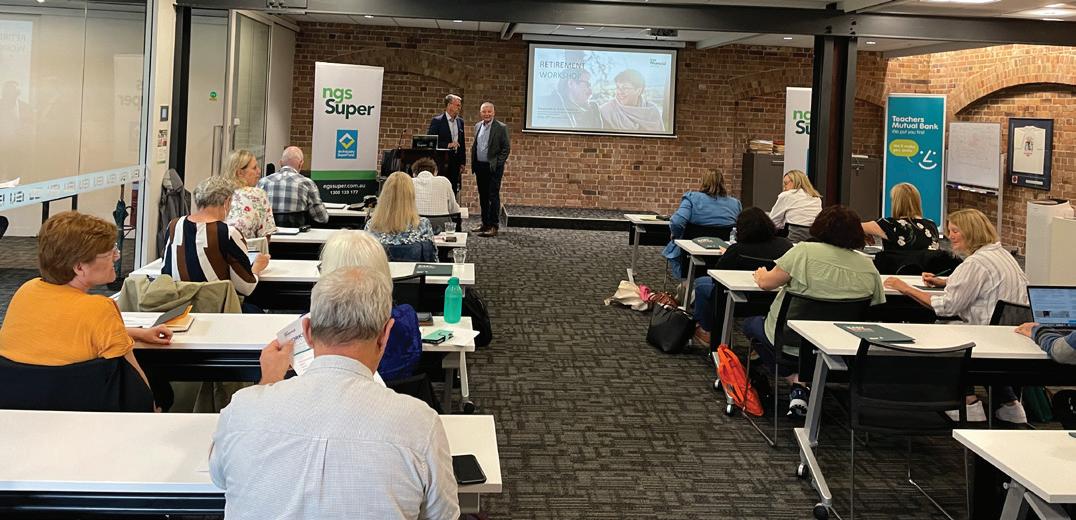
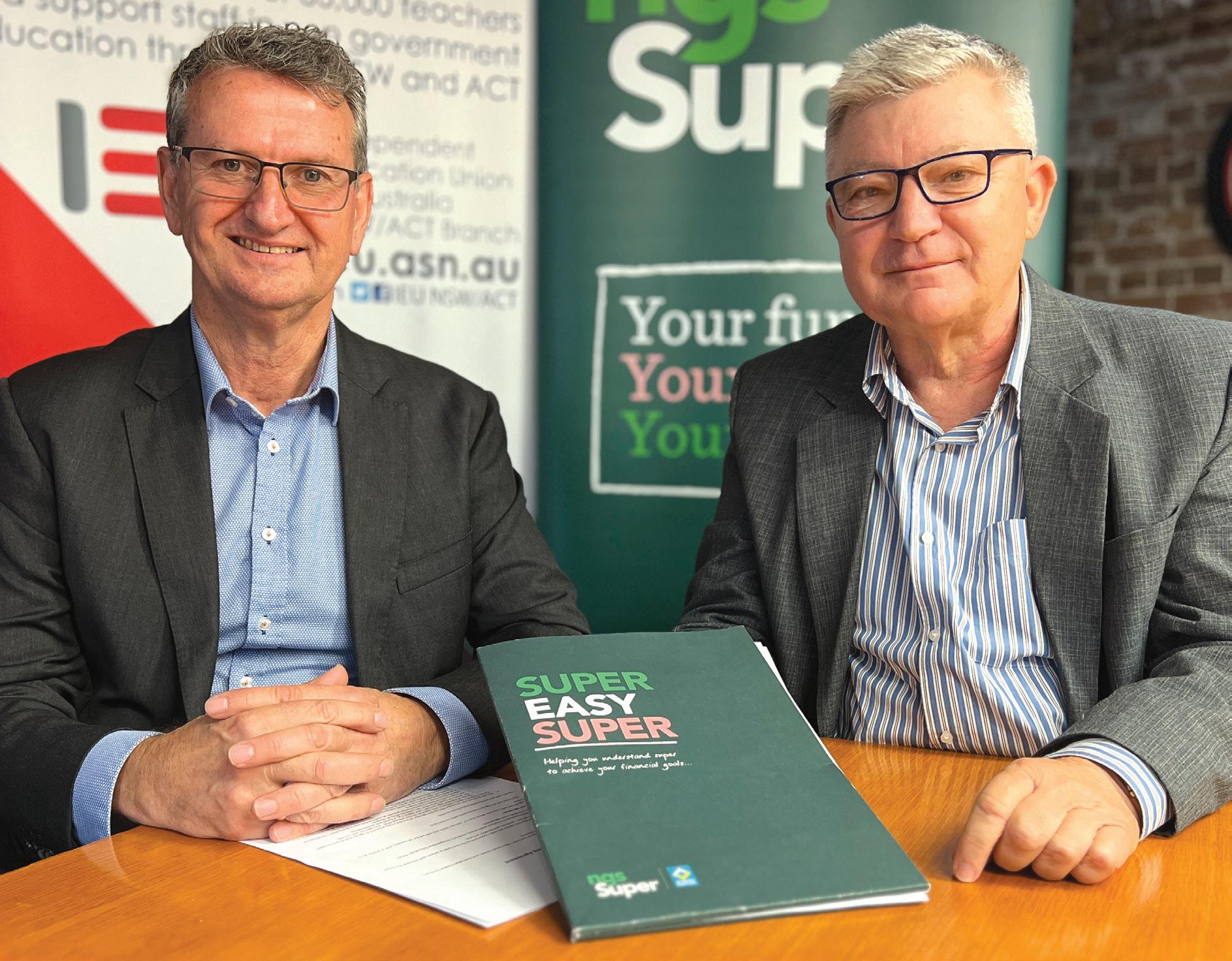
Being a member of your industry super fund is a good way to get ahead. Industry super funds over the long term have performed better, have had lower fees, and have insurance appropriate to your industry.

Most industry super funds work with Industry Fund Services to proactively identify and recover unpaid super from bosses who haven’t paid or if the employer goes through insolvency. Just another reason to be in an industry super fund.
3 Bargain for better super
A big part of being in a union and getting a better deal for workers is negotiating an enterprise agreement and bargaining for super. Workers bargain not only for a better deal, but to ensure super is paid above the minimum, on time, in full, and on all wages.
By default, many workers miss out on super, but with your union you can fight for a better deal in super and to make sure that your super is contributed to an industry super fund.
4 Decide if you want to contribute to your super via salary sacrifice
Thanks to the Superannuation Guarantee, all employers in Australia must provide contributions to your super that are minimum 10.5 per cent of your ordinary earnings. These contributions are paid on top of your regular wages and will increase to 12 per cent over the next three years.
If you want to make extra contributions to your super beyond what your employer provides, you can choose to salary sacrifice.
Salary sacrifice is when a certain amount from your income is transferred regularly as a pre-tax contribution into your superannuation.
These contributions are taxed at a lower rate of 15 per cent (provided you contribute less than $27,500 per year).
Your employer is the one who makes the transfer before you’re paid. So not only does salary sacrificing mean your super account is bolstered, it also reduces your taxable income.
How union members are pushing for fair retirement
Lower paid workers are automatically on the back foot when it comes to super. There are also other inequalities
that come into play that see women and Indigenous workers retire into poverty.
This unfairness is exactly why union members continue to campaign for stronger superannuation laws.
In 2022, we saw an increase to the superannuation guarantee from 10 per cent to 10.5 per cent as well as the abolition of the $450 threshold.
Workers who were earning less than $450 per month with a single employer were not entitled to the super guarantee. Removal of the threshold as of July 2022 was only good news for low income earners and working women in particular.
We have already achieved regular increases to the superannuation guarantee so that it reaches 12 per cent by 2025. But unions are still working towards having that delay scrapped so we can see the 12 per cent guarantee implemented as soon as possible.
The results we have seen in 2022 have come about due to thirty years’ worth of collective action from union members.
Disclaimer
The information set out in this article is of a general nature only and should not be taken as a complete or definitive statement about superannuation, superannuation funds and other service providers listed therein. You should not make decisions concerning your superannuation arrangements solely based on the information contained on this website.
The information in this article has been prepared without taking into account your objectives, financial situation or needs.
Before acting on that information, you should consider its appropriateness having regard to your objectives, financial situation and needs. You are responsible for your own investment decisions and should obtain individual tailored financial advice whenever necessary.
14 newsmonth - www.ieu.asn.au
NGS Super Customer Relations Manager Brent Hopping (above left) with IEUA NSW/ACT Branch Secretary Mark Northam; and Brent Hopping and Mark Northam address superannuation and retirement planning workshops for IEU members, hosted by NGS and held at the union’s Sydney headquarters in late January.
New Year Check your super
IEUA NSW/ACT Branch Executive

Secretary
Mark Northam
Eora Nation
Deputy Secretary
Carol Matthews
Eora Nation
Assistant Secretary
David Towson
Dharug Nation
Assistant Secretary
Veronica Yewdall
Eora Nation
President
Tina Ruello
Catherine McAuley Westmead
Dharug Nation
Deputy President
Libby Lockwood
St Joseph’s Primary School West Tamworth
Kamilaroi Nation
As we usher in 2023, it is important to check your super to be sure it’s customised to fit your age, your risk profile and your insurance needs. Here are three important areas for you to consider.
Investment
Are you invested in NGS Super’s default option (Diversified (MySuper))? This option is designed to suit most Fund members and is based on an investment model of approximately 70 per cent growth assets and 30 per cent defensive assets. It is constructed around the concept of diversification and has performed well over five (5.21 per cent pa) and 10 year (7.36 per cent pa) periods to 31 December 2022. Are you just starting out in your career or are you approaching retirement? Your age may be a consideration in terms of your risk profile. If retirement is 30 years away, you may be able to accept more risk than a person who has only a few years before retirement. NGS Super offers a wide range of investment options which can be customised to suit individual preferences as well as a team of qualified financial planners who can assist you to design an investment portfolio that suits your age and risk profile. Another important consideration is salary sacrifice, which offers a tax incentive to encourage people to build their retirement balance. Currently, workers receive a 10.5 per cent compulsory contribution from the employer and this figure will move up to 12 per cent on 1 July 2025. With salary sacrifice, members can contribute up to $27,500 per year including the employer contribution. Salary sacrifice contributions are taxed at only 15 per cent (up to the limit) rather than at marginal tax rates. This can result in significant savings in tax which over time will increase the retirement nest egg.

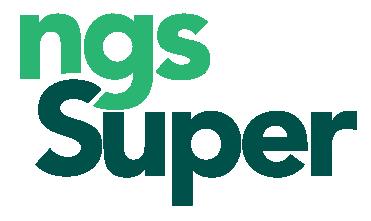
Insurance
Are you under-insured, over-insured or not insured at all? Your Member Statement will show you your levels of cover and the premiums deducted for your insurance. NGS Super has carefully designed its insurance products over the years and has won significant industry awards for insurance. The reasons for this success are simple: the design of the insurance policy, the benefits members receive and the competitive cost of cover.
NGS Super offers death cover, total and permanent disability and income protection insurance as a default for
members who meet the eligibility criteria.
Insurance offered through superannuation funds can be cheaper than retail insurance products because of the scale of membership. It is a genuine member benefit which thousands of members and their families have taken advantage of over the years. Members can dial-up (increase) their cover subject to approval by the insurer, or dial-down their levels of cover, or cancel their insurance completely. So have a think about your insurance needs and look at your present cover to see if they are congruent.
Nominated beneficiary
Who gets your super in the case of your death? This has been in the media lately and certainly many members do not understand how it works. Superannuation is held in a trust and does not automatically become an asset of a deceased member’s estate. In the case of a non-binding death nomination, or no nomination at all, the Trustee is legally obliged to investigate the late member’s personal circumstances (married, de facto, children) to locate a valid dependant and distribute the death benefit accordingly. A dependant must fit into one of the following categories: spouse (married or de facto); child (of any age); or an individual who was in a financially interdependent relationship with the deceased. In the case of a valid binding death nomination, the Trustee has no discretion as to where to pay the benefit.
It must be paid to the named beneficiary or it can be paid to the estate if this is what the deceased had stipulated in the binding nomination. In this case the benefit is paid to the executor of the will and is distributed in terms stipulated in the will. A valid binding death nomination provides the assurance of to whom the benefit will be paid. You can call the NGS Super Help Line to assist you with your beneficiary nomination if you have any questions. These matters are important, and it is good to know that you have them set up correctly.
Bernard O’Connor former Company Secretary NGS Super
Vice President Non Systemic
Helen Templeton
St Scholastica's College Glebe
Eora Nation
Vice President Systemic
Bernadette Baker
St John's Catholic Primary School Dapto
Dharawal Nation
Vice President ECS
Michelle Thompson
Shore Preparatory School
Early Learning Centre Northbridge
Eora Nation
Vice President Support Staff
Kylie Booth-Martinez
Assumption Catholic Primary School and St Stanislaus College Bathurst
Wiradjuri Nation
Vice President ACT
Angela McDonald
St Thomas Aquinas Primary School
Charnwood
Ngunnawal Nation
Financial Officers
Denise McHugh
NESA Liaison Officer
Kamilaroi Nation
Suzanne Penson
MacKillop College Port Macquarie
Birpai Nation
General Executive Members
Christine Wilkinson
St Joseph's Catholic College East Gosford
Darkinjung Nation
Sarah Gardiner
St Paul's Catholic College Booragul
Awabakal Nation
Anna Luedi
Marist Catholic College North Shore
Eora Nation
Glenn Lowe
St Joseph’s Catholic High School
Albion Park
Dharawal Nation
Liz Heggart
Penola Catholic College Emu Plains
Dharug Nation
Peter Moore
Our Lady of Mercy College Burraneer
Tharawal Nation
Simon Goss
Wiradjuri Nation
Nicole Downey
St Mary's Catholic Primary School Orange
Wiradjuri Nation
newsmonth - Vol 43 #1 2023 15 Our locations Sydney: 485-501 Wattle Street, Ultimo NSW 2007 8202 8900 Parramatta: Level 2, 18-20 Ross Street, Parramatta NSW 2150 8202 8900 Newcastle: 8-14 Telford Street, Newcastle East NSW 2302 4926 9400 Lismore: Unit 4, Lismore Professional Centre, 103-105 Molesworth Street, Lismore NSW 2480 (temporarily closed due to flood damage, call the IEU on 8202 8900) Canberra: Units 11 & 12, 3-5 Phipps Close, Deakin ACT 2600 6120 1500 with Professional Development and Reps Training www.ieu.asn.au
(Important information: the information in this article is general information only and does not take into account your objectives, financial situation or needs. Before making a financial decision, please assess the appropriateness of the information to your individual circumstances, read the Product Disclosure Statement for any product you may be thinking of acquiring and consider seeking professional advice. Past performance is not a reliable indicator of future performance. Any opinions are those of the author and do not necessarily reflect the view of NGS Super.)
Our Members Be Unlimited
Author: Sam Wallman
Publisher: Scribe Publications

An original and visually powerful exploration of unionism. In our current political climate, people are looking for answers — and alternatives. The promise of unions is that their ‘members be unlimited’: that they don’t belong to the rich, the powerful, or special interests, but to all workers. With a dynamic and distinctive art style, and writing that’s both thoughtful and down to earth, Our Members Be Unlimited serves as an entry point for young people or those new to these notions of collective action, but also as an invigorating read to those already engaged in the struggle for better working conditions — and a better world.
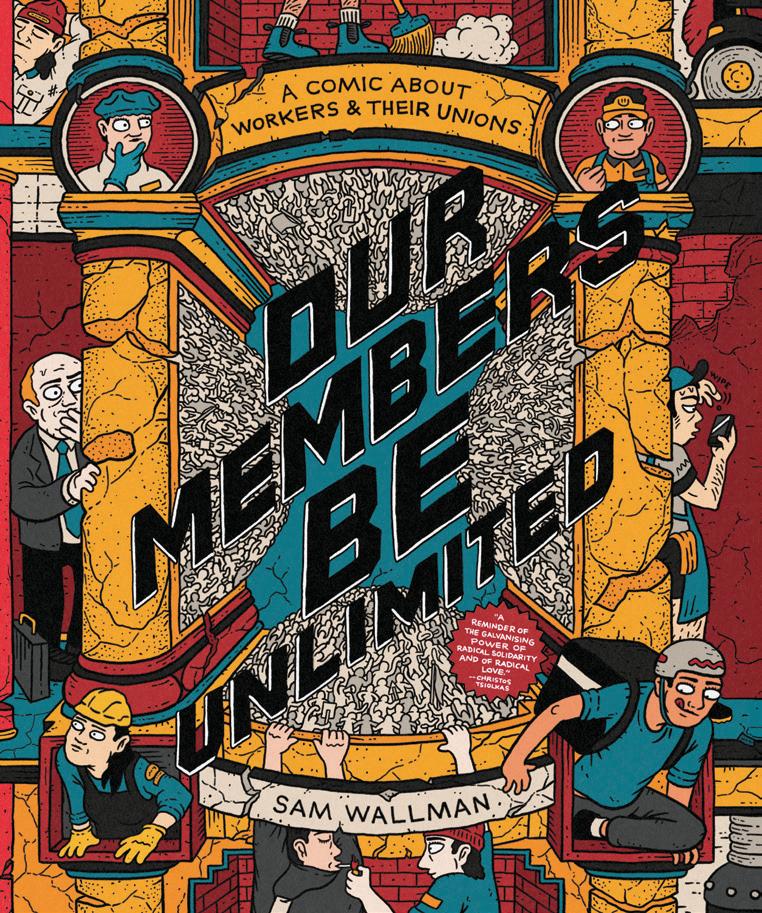
The Family Travel Handbook

Publisher: Lonely Planet
Full of practical advice, ideas and inspiration from Lonely Planet’s parents to you, this essential guide gives you the lowdown on the wealth of amazing travel experiences around the world – and how to plan and enjoy them with your family. From navigating air and train travel to approaching unfamiliar meals and a change in routine, The Family Travel Handbook encourages curiosity, exploration and independence. Whether your family are experienced jet-setters or unsure where to start taking your kids, we’ll show you how rewarding and memorable opportunities for family travel exist at every turn.
Finding the Heart of the nation
Author Thomas Mayor
Publisher: Hardie Grant Books
This is a book for all Australians.
Since the Uluru Statement from the Heart was formed in 2017, Thomas Mayor has travelled throughout Australia to promote its vision of a better future for Indigenous Australians. He’s visited communities big and small, often with the Uluru Statement canvas rolled up in a tube under his arm.
Thomas believes we will only find the heart of our nation when the First Peoples – Aboriginal and Torres Strait Islanders – are recognised with a representative Voice enshrined in the Australian Constitution.
“Thomas’s compelling work is full of Australian Indigenous voices that should be heard. Read this book, listen to them, and take action.”– Danny Glover, actor and humanitarian.
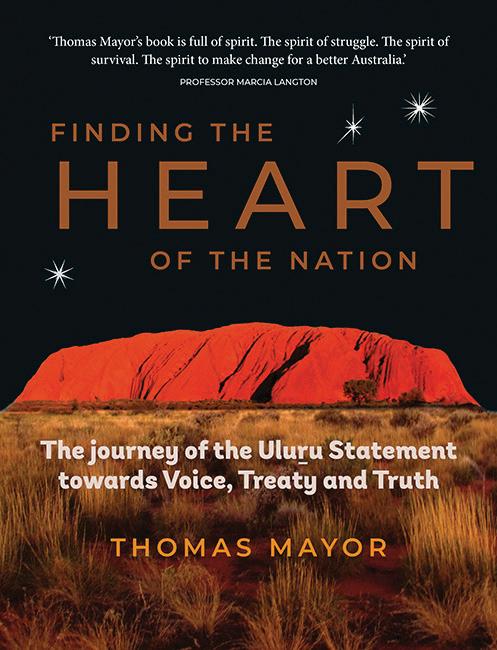
NGS Super is the Best of the Best.
16 newsmonth - www.ieu.asn.au Delivering value today that’s there for tomorrow. The results are in. NGS Super has been judged Money magazine’s 2023 Best Value Balanced Super Product. NGS Super is committed to providing simple, highquality products that deliver value to members. Join a value for money fund that will take care of you today and tomorrow.
5354 (0123) Issued by NGS Super Pty Limited ABN 46 003 491 487 AFSL No 233 154 the trustee of NGS Super ABN 73 549 180 515 ngssuper.com.au 1300 133 177 Find out more Email entries to giveaways@ieu.asn.au with the title of the book you would like to receive in the subject line. Write your name, membership number and postal address in the body of your email. All entries must be received by 20 March 2023.






















































